
2024 Last Ring Notifications
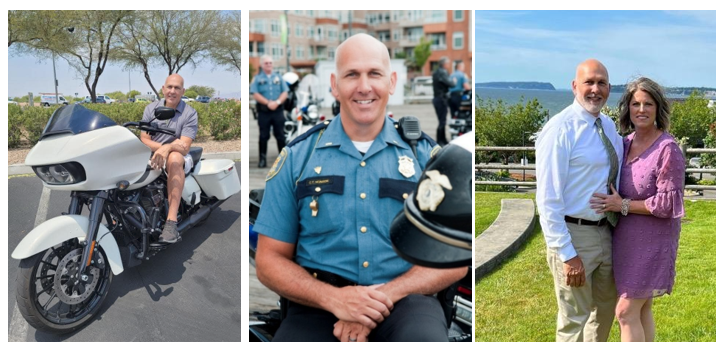
Clay Monson #4904, retired Seattle police lieutenant, passed away on December 26, 2024, at 60 years of age.
Clay was born in Minnesota but moved to Mountlake Terrace as a baby. Growing up there, he excelled in sports, playing basketball, football, and track, and played the saxophone in school band. His passion for football started in high school while playing with his brother, Jim. In 1980, the Mountlake Terrace Hawks basketball team won the WESCO championship and made it to the final 16 in the state, losing by just one point to reach the final eight.
Clay wanted to be a police officer from an early age. After graduating in 1981, he joined the Army Reserves to earn points for the police entrance exams, since he needed to be 21 to become an officer. He served as a Military Police in the 320th Battalion and worked with fellow officers at Fort Lawton in Discovery Park. Clay worked alongside John Lewis #R055, Fred Hill #3299 who all were supervised by Reserve Commander and SPD Major Al Terry #2243.
It was during this time that Clay played semi-pro football for the Seattle Cavaliers Football Team, which existed from 1955 until 1990. Additionally, he had a job working plain clothes security at the Sears store in Shoreline and kept busy taking classes at Shoreline Community College.
His four years in the reserves were nearing an end and Clay was testing with departments when he was hired on May 6, 1985, and entered Academy Class #183. He was elected as the Class President and graduated the academy along with Mike Nolan #4903, Joe Fewell #4896, Tim Wear #4900, Pierre Davis #4806, Tom Bacon #5144, and Seth Dietrich #4901.
Once he graduated and was released from FTO, Clay was assigned to 2nd watch West Relief squad, working with his first FTO, Greg Pote #4257. About a month on his own, on January 13, 1986, while the squad was having lunch, Pote expressed his frustration with the slow day. Soon after, they received a call about a suspicious man at Rainier Bank, which had been robbed previously. Arriving at the bank at 301 W Nickerson, the squad learned that three employees had already triggered the alarm after spotting the same man in a trench coat who had robbed the bank the week before.
Clay and Greg Pote arrived at the front of the bank. Rick Monzon #4161, who was with Clay, went to cover the back. As Clay and Pote approached the front, a suspect came out with an AR-15 and began shooting. At that time, SPD had revolvers, and not all patrol cars were equipped with shotguns. Pote was grazed by a bullet, and Clay was hit by shrapnel when a round fired at him ricocheted off the door after Pote shot the suspect in the head and fell. Following this incident, the department decided to switch from revolvers to automatic firearms. The suspect, a known bank robber, was considered incompetent due to a brain injury. Clay used the bank robbery story to teach and mentor others throughout his career.
The exact year that Clay began participating in the Bacon Bowl is unknown, but he played for several years and always wore jersey number 88. By 1990, Clay had been assigned to the Emergency Response Team (ERT). Although we do not know the specific date of his promotion to Sergeant, he is quoted in a news article as serving as the Sergeant assigned to the DUI Squad in 1995.
Back in 1996, Mountlake Terrace officer Keith Poteet, a lifelong friend of Clay and his family was working the graveyard shift when he was dispatched to a burglary in progress. The address piqued his interest because it sounded familiar. Dispatch mentioned that the reporting party was an off-duty Seattle officer who was currently in a scuffle with someone, which to Keith confirmed it was Clay.
When Keith arrived, he called for Clay, who was upstairs wrestling with the guy, clad only in his tightie whities! Keith stopped in his tracks and exclaimed, “Dude!” After they got him in custody, Keith couldn’t help but ask where Clay's gun was. Clay jokingly said, “Don’t ask!” and then admitted, “I left it in the car.”
Clay had a great sense of humor and told Keith he should share the “tightie whitie” story at his memorial, knowing it would lighten the mood and bring some laughter. Keith felt it was the perfect anecdote to share here, especially since he found it hard to find the right words during the memorial.
On March 9, 1998, Clay replaced retired T3 Motorcycle Sergeant Jack Hanson #2869. The squad didn’t know how much Clay would soon change their lives simply by asking, "Why are we doing it this way?" Traditionally, the T3 squad had been the starting ground for new motor officers, which led to a workweek from Tuesday through Saturday. This schedule placed the team at a disadvantage regarding overtime. To ensure fair overtime distribution, the squad was working many hours and was exhausted. Clay recognized the team's issues and changed the squad's schedule, boosting morale and motivation for the good of all.
Clay loved Sammy Hagar and Van Halen. For years, he along with a group of friends started attending their concerts in the Key Arena, then Climate Pledge, later in Vegas. In the late 1990’s the group flew down to Vegas and continued this tradition up through 2023.
During the latter part of 1999 and the beginning of 2000, the stock markets experienced notable growth, prompting Clay to embrace new professional challenges. He decided to leave his role in the department to pursue a career in day trading. Despite the eventual downturn in the dot-com market, Clay returned to his previous position on March 23, 2001, with confidence and no regrets. Clay is believed to have served at the North Precinct, as he is featured in numerous news articles concerning the University District, in which he is quoted.
On June 22, 2005, Clay was promoted to the rank of Lieutenant. In 2006, he and his sister established their first 911 Driving School, where Clay discovered his passion for teaching young individuals. He employed several officers to assist with the school's operations and dedicated himself to both teaching and managing the business for 13 years.
In February 2008, Clay was referred to in a news article regarding the North Precinct. That same year, he married Stacey, and together they began their family. In 2013, Clay was assigned to first watch East, where he stayed until June 30, 2015, when he retired from SPD after 30 years of service.
In July 2015, the family moved to Henderson, Nevada and Clay started as an officer with the Las Vegas Metropolitan Police Department. He worked there for about 9 years.
In 2018, Clay started working for the Clark County Office of Public Safety for two years, during which time he oversaw the courthouse. In 2020, Clay left the police department to stay home to teach his younger children school during COVID. He stayed home for 1.5 years teaching 3rd- and 4th-grade studies. In 2021, Clay was hired by the Clark County Park Police. He was a year shy of full retirement, but it was time to move the family back to Goldendale, WA, to be near family and friends. In 2023, Clay saw an advertisement and called the Klickitat County Prosecutor’s Office to inquire about an investigator position. A phone conversation on Friday led to his flight on Monday and he was hired on the spot. The first case he received was a homicide case. As it turned out, he should have done investigations sooner. He loved working investigations, digging deeper and he had a knack for it.
During the same time, Clay had decided he wanted to travel around the US on a motorcycle. So, he bought a Goldwing and set about his travels. Clay would ride for a while, stop and visit friends, then when he had to come home, he would find a police or fire station motor pool to park his motorcycle, ask them for a ride to the airport and he’d fly home for treatment. He would then fly back to his bike and continue his journey. Clay worked and rode until he couldn’t anymore and on December 26, 2024, Clay passed away at 60 years of age.
Clay was a compassionate and charismatic individual who had a profound impact on those around him. Even in school years he was known to stick up for those being bullied. Clay treated everyone with respect regardless of their status or rank. Clay had a lot of character, a strong conviction and he embodied a no-nonsense approach that earned him respect as both a leader and police officer.
Clay was hardworking, intelligent, and a great athlete, showcasing an intense competitive spirit in both sports and his professional life. He prioritized his family above all, making decisions centered on their well-being. Clay's positive influence and ability to connect with people inspired many to lead with kindness and strength, leaving a lasting legacy of compassion and resilience.
Clay is survived by his wife Stacey, his sons, Bo, Dillan, and Callan. Daughters, Paige, Brooke, and Ellie. His granddaughter, Blake, five brothers and two sisters and numerous family and friends.
Written by: Stephanie Coleman
Seattle Police Pension Office
Stephanie.coleman@seattle.gov
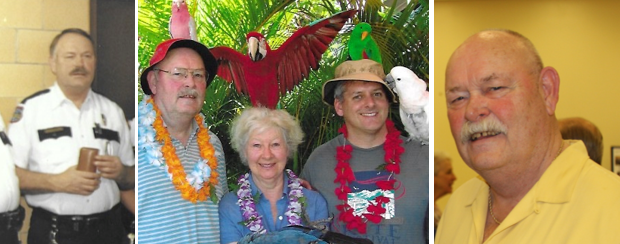
John Larson, Jr. #2060, retired Seattle police detective, passed away on December 24, 2024, at 87 years of age.
John was born and raised in the West Seattle area. After graduating high school, he enlisted in the U.S. Marines. Following basic training, John was assigned to the USS Toledo, where he provided air support for the Marine Expeditionary Force. He served in the military from 1954 to 1957.
John was hired on July 25, 1960, and entered class #42 along with Dean Murphy #2068, Gerald Barmann #2083, Dick Auve #2072, Hal Fogus #2061, Wally Long #1097, Sean O’Kinsella #2076, Harry Schneider #1430, Maury Erickson #2063, and Paul Jasperson #2082 to name a few. Upon graduation he was assigned to the Georgetown Precinct.
After two years on patrol, John progressed to motorcycles and spent four years there before transferring back to patrol on March 3, 1966, and assigned to the West Seattle area.
During this time John was active on the SPD Slow Pitch Softball Team. This team had nine wins and one loss and went on to play in the Puget Sound Law Enforcement Tournament. John P Sullivan #2184, Ken Baggen #2523, Howard Baus #2218, both Dennis #2134 and Jerry Jorve #2197 amongst others were coached by Carl Sandbeck #1841.
In 1967, John was recognized by the department for his calmness and understanding during a deeply emotional time surrounding a death he responded to. His compassionate approach during such a difficult time for the family demonstrated not only his dedication to his duty but also his genuine care for people.
In the late '60s to early '70s, John was given the opportunity to serve on the mayor’s detail. However, it soon became evident that John's navigational skills weren't quite up to par. After a few instances of tardiness, the situation transformed into a light-hearted routine, where the mayor would provide directions from the back seat. Despite this playful dynamic, John decided it was best to return to patrol.
On January 1, 1976, John was promoted to Detective and initially worked in the IIS for a time before transferring to the Auto Theft Unit. Around 1983, Seattle was dealing with a significant problem related to stolen vehicles. In a Seattle Times article, John stated that Seattle had a car recovery rate three times higher than that of New York City, attributing this to the fact that most stolen cars were taken by individuals who were only in need of transportation. That year, over 88% of stolen vehicles were recovered in Seattle, compared to a nationwide recovery rate of 52%.
On February 4, 1986, John arrived for work bright and early one morning and noticed that the elevator kept stopping at the sixth floor, which was home to the old jail in the Public Safety Building (PSB). Intrigued, John decided to check it out. When he stepped off the elevator, he was surprised to find Steve, a man who had been stuck in a tiny cubicle. Steve had just spent an unexpected nine hours in solitary confinement, with nothing but the concrete floor to sit on. He had come to the PSB around 10:30 PM the night before to report an assault but accidentally took the elevator up instead of down. After getting off and pushing past an open barred door, it closed behind him, trapping him inside. He had been calling for help for hours, but nobody heard him. John brought Steve back to the lobby, laughing as he returned to the office, saying, “No one’s going to believe this!”
Years earlier, while working patrol in West Seattle, John responded to a call and found himself doing a report for a female named Marjorie. She had offered him coffee, made the old-fashioned way, pouring hot water over the grounds, much like Turkish coffee, and in that brief, ordinary moment, something memorable began. Years later, fate stepped in again when John, then working at the PSB, stepped into an elevator and unexpectedly saw Marjorie. Recognizing her instantly, he greeted her with the nickname he had given her long ago: “Pan Fry.” That chance reunion led to conversation, dating, and ultimately to marriage in 1988, a love story born of happenstance and lasting connection.
On September 15, 1990, after 30 years of service, John decided it was time to retire. But that didn't last long, as Joe Sanford #1896 quickly hired him for the new Muni court Marshal's job, where he spent the next five years. After that, John went to work for King County Courthouse Security and worked with Vic Ensz #2537 and Norm Case #2177.
After finally retiring, John spent several years traveling to the SPRA condo in Maui, which became a cherished family destination. In retirement, he and Marjorie embraced life on the road, traveling extensively in their RV, spending time in Palm Springs, and enjoying the freedom to explore together. They remained active in their community and could often be found at RAP Club Summer Picnics and RSPOA Banquets, always eager to reconnect with friends.
John was a man of depth and kindness, whose presence put others at ease. He enjoyed simple pursuits such as golfing, immersing himself in war history and literature, and playing cribbage, where he excelled. His sharp sense of humor often left people smiling. John cherished outdoor time, particularly hunting deer and elk with his friend Rudy Sutlovich #2544. He extended the same compassion to others, being a kind, caring, and loyal friend who maintained connections throughout his life.
John passed away on Christmas Eve 2024. He is survived by his wife of 36 years, Marjorie, his children Jennifer, Brian and Colleen as well as three grandchildren and one great grandchild.
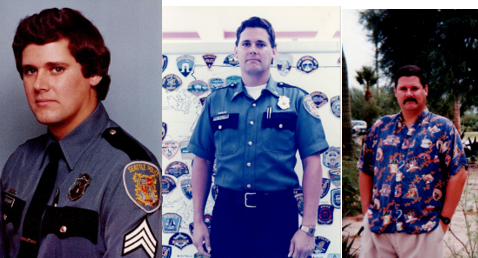
Steven Quint #4059, a retired Seattle Police Lieutenant, passed away on December 15, 2024, at the age of 69.
Steve was born in Kansas City, Kansas, and moved to Seattle with his family at the age of four. He was raised in a family deeply rooted in the medical profession; his father, brother, and grandfather were all physicians.
From an early age, Steve excelled academically, athletically, and musically. He played baseball from an early age and stood out as an exceptional athlete. While at Roosevelt High School, he was selected as one of the top five for the All-Metro team as an outfielder who led the league with a .457 mark. Steve graduated as valedictorian, received All-Star recognition in both basketball and baseball, he was recognized as a talented trombone musician. These accomplishments reflected his lifelong commitment to discipline and excellence. His interest in policing developed during his youth through interactions with officers who served as baseball coaches, ultimately inspiring him to pursue a career in law enforcement.
After graduating from high school in 1973, Steve attended WSU, where he earned a bachelor’s degree in criminal justice, graduating summa cum laude and inducted into Phi Beta Kappa. During his time at WSU, he met and became friends with Bob Robbin #4351. Steve convinced Bob to apply to the department.
While in college Steve remained active in sports and worked a variety of summer jobs, including construction labor, food service, and concession management. Reaching the age requirement, Steve applied to the Seattle Police Department. Steve graduated college early and was hired as a recruit on December 10, 1975. Steve entered the academy in class #85, alongside classmates such as Dave Peppard #4080, Cyndy Miller #4064, Toni Harrell #4060, Ed Caalim #4072, Jeff Caldwell #4075, Linda Gow #4074, Ron Wilson #4069, Ken Conder #4077, and Ivory Brooks #4058, among others. This class was the last six-month academy session, and Steve graduated at the top of his class.
Steve's police career advanced quickly. He spent three years as a patrol officer, primarily assigned to the night shift at the East Precinct. He later worked at the West Precinct, taking on both car and foot patrol assignments. It was during this time that he earned the nickname "Bambi Eyes," given to him by a female worker while on a vice assignment, due to his big brown eyes and long lashes. The nickname stuck.
During a training course, Steve encountered Chief Fitzsimons #4192 who inquired about the problems in Vice. Steve expressed his concern that the possible legalization of prostitution could lead to more issues. Following this discussion, Steve was assigned to write a paper on the topic. The chief appreciated Steve's work and offered him a chance to apply for two positions: one in research and planning and the other in media relations. Steve chose the research position and was asked to take the sergeant’s exam.
On October 16, 1980, Steve was promoted to Sergeant just 3.5 years into his career. He was assigned to Recruitment and Personnel and later to the South Precinct. On December 14, 1984, Steve was promoted to Lieutenant and assigned to 1st Watch West as the watch commander. He served in that role for a time and transferred to the Seattle Center.
Around 1986, Steve requested a transfer to the police academy where he found great purpose in developing future officers. Additionally, Steve had been attending the University of Washington working on his master’s degree.
For several years Steve had been playing on the SPD central basketball team. In 1987 the team went on to win the state tournament, defeating the Bellevue Fire team. Steve had earned a spot on the all-star team, contributing to their success as they triumphed in a 16-team tournament.
Steve briefly attended the University of Puget Sound School of Law, he quickly made the decision to step away from any legal career. In 1987, he earned his master’s degree in public administration and found a path that felt more aligned with his aspirations and values.
Throughout his career, Steve was highly regarded for his analytical thinking and integrity. Some viewed his progression in rank as ambition yet, he experienced it as expectation and pressure. Steve recognized the significant personal challenges that a career in policing had on his well-being, particularly as he faced the effects of severe PTSD. On October 17, 1989, after 12 years of service, Steve retired.
Despite the PTSD, Steve consistently stated that he would choose police work again without hesitation, and that nothing in his life brought him greater pride than serving as a Seattle police officer.
Steve was not only a thoughtful leader but also a compassionate public servant who embraced his responsibilities with integrity and honesty. His professional journey and personal efforts reflected his exceptional intellect and his dedication to others.
Steve is survived by his sister Susan, brothers Robert and Howard, and seven nieces and nephews.
Written by: Stephanie Coleman
Seattle Police Pension
Stephanie.coleman@seattle.gov
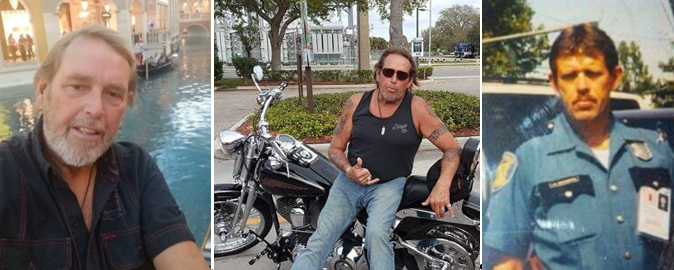
Larry Brotherton #5284, retired Seattle police sergeant, passed away on December 9, 2024, at seventy-five years of age.
Larry Brotherton was born in San Diego, California, to a U.S. Navy officer. Growing up, he learned that home is about the people around you, not just a single place, as his family frequently moved due to his father's job.
At 17, Larry joined the US Army, feeling it was his calling. He served as a Military Police officer and completed special training with the 82nd Airborne Division and Special Forces. Over 22 years, he built a notable military career, including three tours in Vietnam during its most dangerous times. Larry received three Purple Hearts, the Medal of Valor, the Distinguished Service Medal, and many other awards for his bravery and resilience. All of these experiences were more than just skills learned; they shaped Larry into a leader.
Alongside his military service, Larry earned a Bachelor of Science degree in Business Management, understanding that leadership required not only courage, but preparation and knowledge. He rose to the rank of Master Sergeant (E-8) and was selected for the Command Sergeant Major Academy. Facing a choice to re-enlist or retire, he ultimately decided to retire from the Army.
After military retirement, Larry continued to follow his call to serve. He was hired on September 7, 1988, and entered SPD Academy Class #224 alongside along with Ron Sanders #5287, Nat Gasperetti #5280, Byron Rand #5288, Brian Kraus #5290, Will Cravens #5285, Joe Davis #5221, Randy Woolery #5286, Rob Blanco #5283 and John McKenna #5281.
Larry had many close friends and partners during his time with SPD. And even though We do not have specific assignments, we know that he was assigned in 1991 along with Felton Miles #5110 as a two person “community police team”, additionally, he worked West ACT; Narcotics and was the Gang Unit Sergeant for several years.
Throughout the department, Larry earned a reputation and “got results.” He became widely known as “The Problem Solver,” a title given by those who relied on him. Citizens and even gang members respected Larry. They knew he was no nonsense but he was always straight forward with them. This is how one of the unit’s stream lights was returned in short order, after being lost for a couple of hours. Larry’s leadership was recognized by the Belltown Business Association with an Officer Appreciation Award, a reflection of the trust he built both within the department and in the community.
Throughout the department, Larry earned a reputation as a problem solver and helper who was always straightforward. Whether he was assisting his academy mate, Ron Sanders, by sitting on the motorcycle of a victim while wearing the rider's helmet, which allowed Ron to take several photos from the driver’s seat of the Ride the Duck to illustrate how the motorcycle rider's white helmet blended in with the white bow of the Duck, or helping community members, his friends, animals or others.
While driving by Joe’s bar and Grill while on patrol, Larry tells Jake Magan #4702 to pull over! Larry had seen a dog tied up to a pole and it was a hot summer day! The two enter the bar and it goes silent. Larry asks whose dog was tied up and a patrol makes the claim. Larry announces, “you’re drinking, he’s drinking, get him a bowl of water!” Every patron in the bar stood up, started clapping, whistling and laughing and the bar tender quickly gave the owner a bowl of water with ice, to ensure the dog was taken care of!
Larry was good at shenanigans. One day, when Jake Magan #4702 left his email open, Larry took it upon himself to send an email volunteering “himself” as Jake for an activity that Jake had no intention of participating in. It took three emails and a phone call for Jake to extricate himself from that assignment. A few weeks later, while Larry was on a call, Jake, the acting Lieutenant, informed him that Captain Steve Brown #4400 was angry about Larry parking his orange Dodge Hemi Challenger in the Captain's spot. When Larry called to apologize at 2330 hours, he woke the captain and launched a long explanation. Confused, the Captain told Larry not to listen to Jake and abruptly hung up!
In 2005, Larry’s courage once again came to the forefront during a critical incident near South Jackson Street. As part of the West Precinct anti-crime team, Larry and fellow officers confronted a group in a stairwell area known for narcotics activity. Without warning, a suspect turned and fired at the officers from close range—before any officer had drawn their weapon. Larry and his fellow officers responded, stopping the threat and preventing further harm. Larry and the other officers received the Seattle Police Department Medal of Valor.
Beyond the uniform, Larry lived fully. He was an avid bowler and a member of the prestigious 300 Club, placing second in the 1994 SPAA Annual Bowling Tournament. He loved boating, snow skiing, swimming, traveling, playing cards, and especially motorcycles. His pride and joy was a custom Indian motorcycle he named “War Pony.” Riding was freedom for Larry, a place of peace, reflection, and joy.
Larry loved his job and the people he worked with. If given the choice, he would have continued working for SPD for another decade. However, he was affected by Agent Orange and later developed cancer, leading to his retirement after 26 years of service in 2014. Larry fought for his health with the same determination that had defined his life, and throughout his treatments, he managed to stretch one year into ten more.
In retirement, Larry found a renewed sense of brotherhood with the Combat Veterans Motorcycle Club. Through this organization, he strengthened his connections with fellow combat veterans and actively participated in efforts to support veterans, their families, and various charitable causes. Although his form of service had changed, his spirit of service remained strong.
Larry's life was marked by extraordinary service, quiet courage, humor, and compassion. He served his country, protected communities, mentored individuals, and assisted those in need. His legacy lives on through the lives he impacted, the officers he worked with, the veterans he supported, and the family he deeply loved.
Larry passed away on December 9, 2024, in Port Charlotte, Florida. He is survived by his wife, Alice Faye; and his children, Larry Brotherton, Jr., Angelic Sparks, Matthew Hammerle, Richard Levans as well as nine grandchildren, ten great grandchildren, and many whom he considered family.
Written by: Stephanie Coleman
Police Pension Office
Stephanie.coleman@seattle.gov
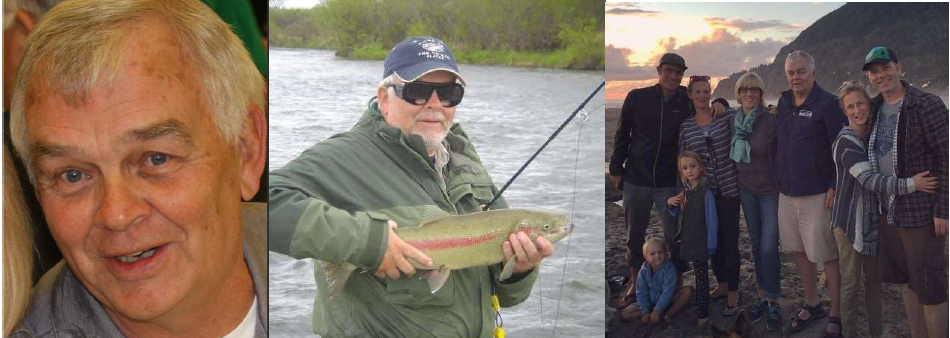
Danny K. Melton #2711, retired Seattle police detective, passed away December 4, 2024, at eighty years of age.
Dan was born in Las Vegas but moved to the Shoreline area at age four. He had a passion for sports, especially baseball, and enlisted in the Navy at 17 during his senior year of high school. After a miscalculation of his age, he did have to leave high school and report to Sandpoint Naval Air Station and attended basic training in San Diego. From 1959 to 1964, Dan served on the USS Valley Forge, working on the flight deck in the Pacific. After his discharge, he joined the Naval Reserves, met his future wife, Tana, through mutual friends, and enrolled at Everett Community College while working as a switch foreman for the Northern Pacific Railway. Dan visited the Seattle Center to catch up with a friend. During their conversation, the officer friend encouraged Dan to apply for a position in the police department. After submitting his application, Dan passed the entrance exam with flying colors but was advised to put rocks in his pockets to meet the weight requirement. Dan and Tana married in January 1967. While waiting for a hire date, Dan worked in a delivery job. Dan was hired on June 12, 1967, and spent two months in patrol before entering academy class #53, along with Mike Germann #2714, Larry Farrar #2360, Francis Riley #2393, Gary Greenbaum #2668, Ray Roller #2690, Pat Lamphere #2687, Mike Tando #2702, Barry Fletcher #2681 and Joe Nicholas #2683. Upon graduating, Dan worked patrol with his partner Steve Butler #2610. In 1968, Dan was happy to see his friend Ken Jakobsen #2963, who he encouraged to apply, be hired.
On July 13, 1970, Dan was promoted to Detective in the Juvenile Division. A year later, he began supervising a new cadet, Buzzy Katzer #3159, who was working undercover in high school narcotics. In 1972, Dan enrolled in the LEAP Program at the University of Puget Sound Extension campus on the 2nd floor of the PSB and earned his bachelor's degree.
Dan was actively involved in numerous activities within the department. He was a long-time member of the SPAA Grey Knights Soccer Team, the Fly-Fishing Club, the SPD Drill Team, and the Ski Club. Dan frequently helped set up, take down, and attend events organized by SPAA, SPOG, SPRA, SPRAG, and GRAM, as well as holiday parties and banquets. Whenever an event needed an organizer, Dan was always willing to step up and take charge. Dan became the Chairman of the Fishing Derby, the Treasurer of the Drill Team and a SPAA Board member.
Outside of work, Dan coached little league, went on motorcycle rides, and enjoyed fly fishing with the Northwest Fly-Fishing Club. His family enjoyed camping throughout Washington State, and he was now active in the Coast Guard Reserves.
In 1979, Dan joined the Special Assault Unit (SAU) before moving to Homicide, where he trained in Louisville with John Nordlund #2909. Partnered later with Gary Fowler #2920, they faced a harrowing scene in 1983 at the Wah Me Club massacre. When Sgt. Don Cameron #2058 redirected them to Harborview (HMC) for a dying declaration, Dan and Gary swiftly donned scrubs and entered the operating room just before the victim was being anesthetized, much to the chagrin of the surgeon.
Meanwhile, in the office, Gail Richardson #2180 and Wayne Plumb #2674 were deep into a double homicide investigation involving Willie Mak and Ben Ng. After reviewing the declaration from HMC, in which the survivor stated “Mak”, Dan and Gary rushed to Willie Mak's parents' house in South Seattle. Willie just happened to call his parents, who handed the phone to Dan. Dan firmly instructed Willie to “just come home” because his parents were upset, and hung up the phone. Following Dan's instructions, Willie arrived at the house and was taken to jail. Rumors suggested that the third suspect, Tony Ng, was hiding near Calgary, Alberta. Using his connections from his years playing soccer, Dan confirmed Tony's location with the Calgary police. After 500 days on the run, Tony was extradited for prosecution.
In 1986, Dan joined the Intelligence Unit and partnered again with Gary Fowler. One of their first cases involved a contract homicide assigned to Detective D. Engle #2777. They were tasked with finding the firearm used by a female assassin, which they remarkably located in under five minutes at the collection center. Learning that the suspect was about to board a flight at SeaTac Airport, they rushed there and apprehended her just in time. Their success was later highlighted in one of Ann Rule's books, where they were called the “Garbage Can Detectives.”
Dan was busier than ever; he landed a job at the SPAA range store and in 1999, WSP heard that Dan had retired and asked if he would join their team as an Intelligence Analyst working with homeland security. Dan held this position until 2004, when he officially retired for good.
Tana was still working for the airlines, and Dan would travel to their home in Palm Desert when he wasn't working, Dan selflessly volunteered to transport children to Los Angeles for treatments at the Shriners Hospital. Back home, he remained deeply engaged with friends and activities including the Northwest Fly Fisherman Club.
Dan was a proud Shriner and a member of the Shurtah, a group for current and retired police officers. He earned his third-degree Masonic degree and served as the High Sharif of the Shurtah. Each year, he organized a fundraiser at the Monroe Fair, featuring delicious beef sandwiches. Dan also assisted with the annual Haunted House at the Nile.
The Nile owned the "Black Mariah," a 1949 police paddy wagon used by SPD for over 22 years. After being purchased for one dollar in 1971 by a SPD captain and Shurtah member, the wagon eventually faced costly repairs. To preserve it, Dan connected with Jim Ritter at the Police Museum and donated the wagon.
Always active with the Retired Officer's Association, Dan was instrumental in negotiating the relocation of the RSPOA meetings to the Nile after the Elks Lodge closed its doors in 2010. He later served on the board.
During their various activities, Dan and Tana traveled extensively, enjoying riverboat cruises and vacations throughout Europe, including Russia, London, the Mediterranean, the Rhine River, and the Seine River, with a side trip to Normandy. They also visited Barcelona, Italy, and Mexico.
Throughout his life, Dan showed a deep commitment to serving others and contributing to his community. His dedication extended beyond traditional volunteering; he was a mentor and a source of inspiration for many, fostering a culture of kindness and support that positively influenced the lives of those around him. Family was central to Dan's life; he cherished his children and grandchildren, finding great joy in being a father and husband. His friendships were marked by generosity, as he consistently sought opportunities to help others and build meaningful connections with everyone he met.
He had a remarkable talent for relating to people, serving as a mentor to numerous officers and detectives. His critiques were always delivered with care, reflecting his desire to uplift rather than discourage. When providing feedback, he approached the task with thoughtfulness and compassion, ensuring that his comments were constructive and intended for the individual's growth. Approachable and eager to lend his support, Dan embodied the essence of a true leader. The positive impact Dan made in the lives of others will undoubtedly resonate with all who had the privilege of knowing him.
Dan is survived by his wife of 58 years, Tana; their son Don and daughter Lydia as well as two grandchildren.
Written by: Stephanie Coleman
Police Pension
Stephanie.coleman@seattle.gov
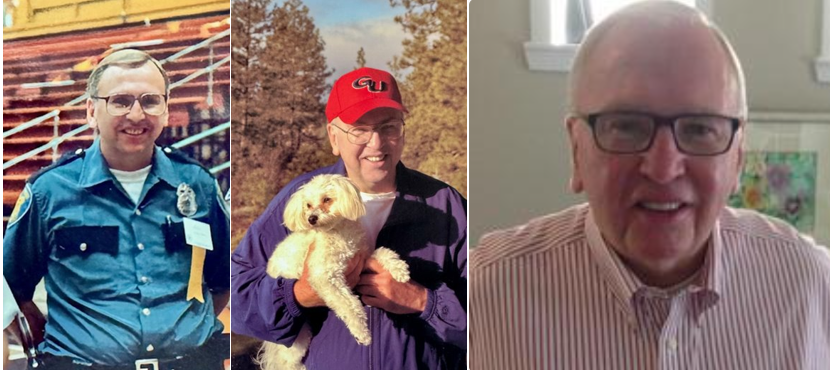
Joseph “Joe” Nicholas #2683, retired Seattle police patrol officer, passed away on December 1, 2024, at 85 years of age.
Joe was born in Spokane and moved to the Seattle area at age six. He attended St. Joseph’s in Seattle and later St. Martin's boarding school in Lacey, where he lettered in football, was class treasurer, and was very active with school activities. During summers, he worked as a night watchman in Alaska with his grandfather.
In 1961, Joe was drafted into the Army as a medic and completed basic training at Fort Chaffee in Arkansas. He was honorably discharged in 1963 without being deployed to Vietnam. Joe returned to St. Martin’s to earn a degree. In March 1966, Joe met Lorraine. He graduated with his BA in English, returned from his Alaska job and they married in September.
Joe sought a stable life and steady job. At a job fair, a recruiter from SPD described the role's benefits, including job security. Believing it was the perfect opportunity, he applied and was hired on March 28, 1967. After spending six months in patrol, he entered Academy Class #53 along with Mike Germann #2714, Larry Farrar #2360 and Erling Butte-Dahl #2704, Francis Riley #2393, Gary Greenbaum #2668, Ray Roller #2690, Pat Lamphere #2687, Dan Melton #2711, Boyd Brenton #2705, Dave Hortin #2448 to name a few.
Joe was assigned to the rioting in the city and had been shot at. A few days later, the academy, which had previously recognized Joe's teaching skills, offered him a position in report writing, which he happily accepted.
On January 1, 1970, Joe was promoted to Detective and assigned to the Burglary and Theft Unit. While there, his academy mate Erling Buttedahl #2704 was involved in a high-profile shooting that attracted media attention, coinciding with a public relations crisis for the police department due to riots and pay off investigations. There were talks about firing Erling, but Joe and Mike Germann, another academy mate, asked to meet with the Chief. They convinced the Chief that it would be unjust to fire Erling, as they believed in upholding fairness and justice in their work.
A year before leaving the Burglary division, Joe received a special assignment known as a "CID special assignment." This investigation took place during the mayoral election, when one candidate reported a city employee in charge of the city’s film coordination unit of being paid for work, he did not perform. Ultimately, the case did not lead to any charges.
In 1974, Joe became the voice of the Seattle Police Department's Community Relations Unit, now known as Media Relations. A transfer to Personnel, after going to Polygraph school occurred on February 18, 1976. Joe worked on background investigations which included polygraph tests. At that time, hypnosis was primarily used to assist victims or witnesses with memory recall in cases such as rape, murder, robbery, assault, arson, and fraud, but never on suspects. At the time, only Joe and Dr. Preston Horstman #4242 were trained and allowed to use this technique.
In February 1982, Joe became the Editor of the SPOG Guardian newspaper, replacing Dick Rovig #1920. Joe had previously been the editor of the SPD Publication.
On January 10, 1983, Joe was assigned to the Seattle Center. In addition to his regular duties, he was assigned as the Explorer Advisor. In 1986, John, a senior at Ballard High School and a member of the Explorer program, passed away unexpectedly, leaving a lasting impact on many, including this writer. Twelve days after Joe's passing, John's sister wrote on his memorial page, recalling how she found John's retired explorer badge and saw Joe's name among the mementos. She felt compelled to thank Joe, only to learn he had just died. She reached out to his family to express her gratitude for Joe's mentorship to John and his support to her family after John's death thirty-nine years later.
In 1987, Joe received a call from a mother seeking help for her troubled 16-year-old son, who had been kicked out and later dropped out of school, had been arrested and was facing charges. After meeting the boy, Joe decided to let him join the Explorer program, seeing his potential for change. Within a few months, the young man became the post captain and later was named Explorer Leader of the Year. He earned his GED, spent 15 years as a senior agent in the FBI before pursuing a law degree. Today, he is King County Superior Court Judge David Keenan.You just never know how much you can affect someone's life.
Joe received a nomination from A/C Noreen Skagen #1990 for the esteemed Silver Beaver Award. This distinguished honor, presented by the Boy Scouts of America at the council level, recognizes adult leaders who have profoundly influenced the lives of youth through their dedicated service to the community.
On May 2, 1994, after 27 years of service, Joe retired. They moved from Olympia to Moyie Springs, Idaho. They spent time traveling in their trailer, creating cherished memories. After 20 fulfilling years they decided to move on as access to medical care was limited, requiring medevac for any healthcare needs. They built their dream home, and they settled in Deer Park, Washington to be near their children and grandchildren.
Joe was never bored and always busy. His greatest passion was people. His profound devotion to others shone brightly, complemented by his unwavering faith and commitment to community service. Whether through Habitat for Humanity, the Kiwanis, or various charitable activities, Joe poured his heart and soul into making a difference, leaving a lasting impact on all those he encountered.
In 2001, Joe decided to go back to school and complete a four-year training program to become an ordained deacon in the Catholic Church through Loyola University in New Orleans. A few years later, he enrolled in another program in Minnesota and later returned to establish the first Deer Park “Grief Share” program. This 13-week initiative is conducted four times a year and is open to all individuals who wish to participate, regardless of their religious background.
Joe diligently practiced his faith until his passing. The Sunday before he was hospitalized, he preached to four masses. The following day, he said, "I don’t really feel good," which led him to the emergency room. Unfortunately, he never returned home.
Joe is survived by his loving wife of 58 years, Lorraine; their two sons Tim and Rob as well as two grandchildren and two great grandchildren.
Written by: Stephanie Coleman
Seattle Police Pension Office
Stephanie.Coleman@seattle.gov
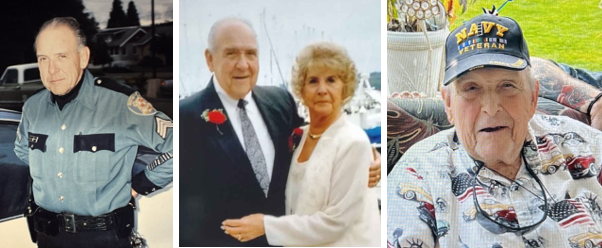
Frances James “Jim” Johnson #1979, retired Seattle police patrol sergeant, passed away on November 9, 2024, at 91 years of age.
Jim was born and raised in Freeport, Maine. He played football in school and kept busy working alongside his grandfather, who was a lobster fisherman. After graduating high school, Jim's family moved to Everett, Washington. He then enlisted in the U.S. Navy, where he served as a Quartermaster. His job was to help navigate the ship safely. He assisted the Officer of the Deck, steered the ship, maintained navigation equipment, handled charts, plotted courses, and performed watch duties on the bridge. Jim served during the Korean War from 1954 to 1958. After his active duty, he joined the Army Reserves.
After being discharged, Jim returned to Seattle and got a job at Pacific Intermountain Express, P.I.E. Trucking. He was living on Capitol Hill when he met and married his wife, Vera. Although he initially wanted to be a teacher, he applied for a job with the Seattle Police Department when they started hiring. The job's stability and benefits were attractive for his growing family, so he was hired on July 6, 1959.
On February 29, 1960, that Jim entered the academy Class #41 along with Clark Elster #2025, John Blackwood #2022, Ray Carroll #1230, Bill Buckwalter #2018, Vern Mackie #1980, Wally Long #1097, Bob Holter #1993, William Meek #1981 amongst others. After graduation, Jim was assigned to patrol and by 1961 he was working in the city jail, on the 6th floor of the PSB. It was there that he met his lifelong friend Don Vert #2168.
Jim later went to work in the special patrol squad (now SWAT) working under Roy Skagen #2204. Although we don’t have the exact dates of assignments on record, by 1968, we know that Jim had recruited Ron Aslett #2823, who was hired the day after Christmas 1967. Then, on January 8, 1969, Jim was promoted to Detective and assigned to the Public Relations Unit with Noreen Skagen #1990.
Jim served as a mentor to several individuals, Buzzy Katzer #3159 met Jim in 1969 as a cadet. Both were assigned under the Narcotics Division. Buzzy fondly remembers how Jim was always willing to offer guidance on processes and procedures that he could use while working undercover in schools.
In March 1970, Jim was working as a CID for the Army Reserves at Ft. Lawton under John Hoberg #1302. He had been tapped to attend the US Army Polygraph School near Augusta, Georgia with Don Vert. Prepared to hunker down for a few months of active duty, Jim told Don they would trade off cooking and doing dishes. Don cooked dinner the first night and Jim informed Don that he’d be doing all the cooking and Don would be doing the dishes from then on.
The SPAA hosted various sporting leagues, including bowling and skiing. Jim was an avid bowler and played on Don Marquart’s #2442 team alongside Vert, Joe Tolliver #1901, Roy Burt #2574, Paul Peterson #1721, and the wives also had a team. They travelled for tournaments to Reno, Montana and Canada
Jim was an avid skier and a proud member of the SPAA Ski Club—a big guy with an even bigger handshake. When people said, “Woe be to the man who gets a handshake from Jim!” they weren’t kidding. His grip was legendary.
One night after a ski trip, Jim and Don Vert were dropped off at Guenther’s Lanes, where they ran into Ed Dolfay, who had drilled many over the years, and was a friend to many. Jim, oblivious to the awe and slight fear his handshake inspired, approached Ed and delivered his infamous grip, leaving Ed yelping. While Jim brushed it off, Don saw an opportunity for some mischief.
The next day, Don called Ed and hatched a plan: Let’s prank Jim! Ed would “pretend” that Jim’s handshake had broken his hand. It was the perfect setup! Don casually mentioned to Jim that he had heard Ed was in a sling due to a broken hand. Jim’s face clearly showed concern. He went right over to Ed, ready to apologize. Moments later, Ed, still holding back laughter, revealed the truth.
On June 26, 1973, Jim was working in the background investigations unit. It was around this time that Roy Wedlund #2154 had set up a University of Puget Sound extension campus on the second floor of the PSB. This program was specifically for those with VA benefits to earn their degrees. Jim earned his BA in Political Sciences
On October 5, 1977, Jim was promoted to Sergeant Detective. In 1978, the King Tut exhibit visited Seattle and ran for four months, attracting nearly 1.3 million visitors during its stay. Around this time, Sergeant Dan Capps #1572 was transferring out, and Dan Oliver #3127, who had previously worked with Jim, mentioned him to Lieutenant Pat Murphy #1653. As a result, Jim was assigned to the center, where he spent a few years alongside Mike Hargraves #2974, Dan Oliver, and John Foley #1247. This assignment was noted as one of Jim's favorites. In addition to his regular duties, Jim took numerous off-duty jobs, including working the rock and gem shows, sporting events, and concerts. Jim also coordinated an off-duty position at the Hilton Hotel, collaborating with Dan Oliver and Tom Brenton #3031.
In 1981, a significant moment occurred between Don Vert and Jim when A/Chief Dave Grayson #1814 offered Don a promotion to Lieutenant. At that time, Don was ranked #13 on the promotion list, while Jim was #6. Don sincerely told Jim that he would turn down the promotion if it jeopardized their friendship. It wasn't just about the job; it was about their strong bond built on trust and respect. Jim reassured Don that their friendship would stay intact despite the opportunity. Together, they showed that integrity can guide tough decisions and that true friendship goes beyond personal ambition.
Around 1982, Jim was assigned as the Sergeant in Juvenile Investigations Unit and on January 4, 1988, Jim sought a change and transferred to the South Precinct Patrol. On New Year’s Eve 1990, Jim’s car got stuck in an icy patch on a hill. When he got out to investigate, he believed he had twisted his ankle, but it turned out he had fractured his fibula.
Jim was ready to retire from his long-standing career with the Army Reserves. After dedicating 19 years to the Criminal Investigation Division, he decided it was time to retire. Jim retired as Chief Warrant Officer 4 on July 23, 1988, after completing a total of 24 years of military service.
By April 28, 1992, Jim had enjoyed a diverse and fulfilling career, but after 33 years of dedicated service, he decided to fully retire from SPD. In retirement, Jim stayed active. He worked as a marshal at the Capital City Golf Course in Olympia, where he had spent many enjoyable years playing golf. Jim and his wife, Vera, owned a home in Arizona, which allowed them to escape the winter months and enjoy the warmer climate. In addition to golfing, Jim explored genealogy and liked playing card games. The couple took several cruises and traveled to Europe twice. They enjoyed their visits to Hawaii, a destination where they had enjoyed many vacations together. Jim was frequently seen attending SERG meetings, the annual banquet, and gatherings with the Blue Clan group in Arizona.
Beneath his gruff exterior, Jim was a genuinely caring and kind-hearted man—a true embodiment of what it means to be a man’s man. He remained fiercely loyal to his family and friends, demonstrating unwavering dedication in all aspects of his life. A hardworking spirit, he fiercely protected his crew, who saw him not only as a colleague but also as a father figure and a steadfast friend. Throughout his life, Jim committed himself to serving both his country and his community. He was an exceptional partner, a remarkable friend, and felt like a brother to many. With Jim, you always knew where you stood; he was candid and forthright yet possessed a gentle, soft-hearted side that made him all the more endearing.
Jim is survived by his sons Tim and David; his daughter Patricia as well as four grandchildren and one great grandchild. Jim was predeceased by his wife of 63 years, Vera; their son Michael and daughter Cheryl.
Written by: Stephanie Coleman
Seatle Police Pension
Stephanie.coleman@seattle.gov
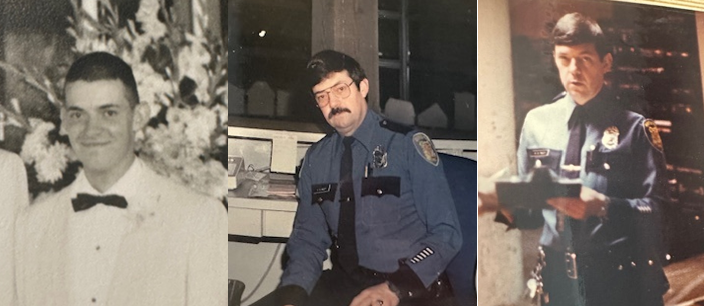
Francis Riley #2393, retired Seattle police officer, passed away on November 4, 2024, at 89 years of age.
Francis was born and raised in Seattle, in the Roosevelt area. His father worked for Seattle City Light, and his mom was a homemaker. For his sophomore year of high school, he attended St. Martin's University, a private Benedictine University in Lacey. This was a boy's boarding school run by monks. It offered college-level courses.
In 1953, Francis graduated from O'Dea High School with classmate Francis Roesler #2127. After graduating, he enlisted in the U.S. Army at Fort Gordon, Georgia, serving in the Military Police. Around 1958, he returned home and began driving a trackless trolley for the city. On March 23, 1964, Francis was hired as a Clerk II Senior in the SPD Photo Lab. On April 25, 1967, he was appointed as a Patrolman and assigned to Academy Class #53 along with Jim Dunn #2675, Dave Malinowski #2400, Jack Vale #2717, Dave Hortin #2448, Gary Greenbaum #2668, Joe Nicholas #2683, Boyd Brenton #2705, Mike Tando #2702, Barry Fletcher #2681, and Dan Melton #2711.
In 1971, Francis worked at West Patrol and briefly at Wallingford Station where he was partnered with John Nordlund #2909. Later, he partnered with Joe Parks #3318, who noted that Francis always smoked his pipe. Joe affectionately nicknamed Francis "Clue-So" and mentioned that he was too nice to be a cop, often describing him as having a Cheshire cat-like smile.
Francis served as the East precinct clerk while both the East and West precincts were located at the PSB. In January 1986, the new East Precinct opened its doors on 12th and Pine. Francis often drove to work in a classic Model T or an old white Dodge. He was well liked and always had a witty conversation or tale to share.
In an amusing incident, while he was on the phone handling a complaint, he leaned back a little too far in his chair and toppled over! Even after hitting the floor, he kept chatting with the caller and puffing on his pipe as if nothing were amiss. Francis was always remarkably cool and composed.
In 1986, Francis wrote to Emmett Watson at The Seattle Times, who then shared Francis's story with readers in the newspaper. Emmett noted that Francis was the clerk at the East Precinct on 12th and Pine, where when Francis experienced lulls in crime, he would jot down memories or interesting facts he knew or read about Seattle. It was clear that Francis had a deep appreciation for nostalgia and took it seriously. In the article, Francis reminisced about how KIRO was known as "The Friendly Station in the Pacific Northwest." He recalled a time when traffic signals only had red and green lights, and all downtown signals had bells. He mentioned the bulb atop the Smith Tower, which indicated the time of day by displaying colors such as red, white, or blue and when the Seattle Gas Company manufactured and sold Gasco Briquettes. Francis asked if we remembered when the Paramount Theatre was referred to as the Seattle Theatre and when Ron and Don made the mighty Wurlitzer really come alive. He reminisced about why the alley between First and Pike to Union was called "News Lane," and why the alley between Second and Third, from Cherry to James, was known as "Opera Place." He recalled riding the #4 streetcar all the way out to Lake Burien, and when the Duwamish River flowed much closer to the Georgetown Steam Plant. He remembered a time when there were two separate telephone companies, Sunset and Independent, which were not interconnected and noted that Ballard's Market Street used to be called "Broadway," and Seattle University was still known as Seattle College. Furthermore, he reminisced about the time when the totem pole in Pioneer Square burned and when Seattle police officers wore all-black uniforms.
After 30 years of service, Francis retired on March 1, 1991. In retirement, Francis found joy in riding his motorcycle, he liked being on the open road and the freedom it provided.
He was a proud member of the historic Seattle Preservation Foundation. With a passion for nostalgia, Francis became a well-known figure in the "Seattle Vintage" social media group. He enthusiastically shared his vast knowledge of local history, often displaying unique items that piqued his interest, such as vintage light fixtures and the notably steep stairs in the Coliseum Theatre, which later became Banana Republic and Monorail Espresso. Francis’ keen eye for detail and appreciation for Seattle's past led to many conversations about our city's rich history.
Described by his friends and colleagues as eloquent and possessing charming manners, Francis had a remarkable ability to infuse humor into his conversations. He was a genuine pleasure to work with, always gracious and supportive. His warmth and wit left a lasting impression on those who knew him.
Francis is survived by his niece Brook and nephew Kris.
Written by: Stephanie Coleman
Police Pension Office
Stephanie.coleman@seattle.gov
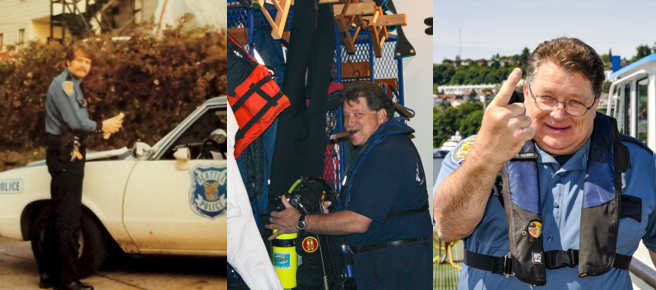
Charles Allers #4196, retired Seattle police diver, passed away on October 18th, 2024 at seventy-one years of age.
Chuck was born in Kentucky, but the family had settled on Bainbridge Island by the time he was five years old.
He participated in football and wrestling during high school, earning letters in both sports. By his senior year, he was aware that his draft number was relatively low, which made him concerned about being drafted into the Army. To avoid this, he enlisted in the U.S. Navy, where he advanced to the rank of Gunner's Mate. In this role, he worked with various armaments, including a twin 3-inch anti-aircraft gun.
Chuck spent three years in the Navy before receiving an honorable discharge. Afterward, he returned to Bainbridge Island, where he attended Olympic Junior College and worked as a carpenter building homes. His uncle, WSP Sgt. Warren “Mac” MacDanold, encouraged Chuck to apply to the WSP. However, Chuck felt he was better suited for Seattle, so he applied there and was hired as a recruit on February 23, 1979. Chuck attended BLET Class #108 alongside Deena Karst #4195, Kevin Aratani #4193, and Chris Gough #4197. During his student officer training, his FTO’s were Dick Schweitzer #3041, Joe Bouffiou #3047, and Ralph Nilsen #3492.
Chuck was initially assigned to the West Precinct but only worked there for a week before transferring to the East Precinct, where he spent the next seven years. During his time at East, he worked all three shifts and covered every sector. He was also active in the Navy Reserves during this period. While on Patrol, Chuck gained a reputation for being exceptionally skilled at locating "rolling stolen" cars. At the start of each shift, he would memorize the "Hot Sheet," which listed stolen vehicles, and once he spotted one, the chase would begin. The sergeant at the time, John Moffat #3522 stated that it was rare for Chuck to go an entire week without apprehending one or two stolen cars.
In 1986, Chuck transferred to the Traffic Section, where he worked in PM Enforcement. He had promised his Captain that he would stay for only two years, but that commitment turned into an eight-year tenure. In 1994, Lieutenant Gene Hunt #2592 called him and asked if he would consider joining the Harbor Division. Chuck eagerly accepted the opportunity, as he had always dreamed of becoming a diver. However, an ear issue had prevented him from pursuing that path in the Navy. That same year, Chuck started at Harbor. He encouraged his sister, Shanna Flannagan #6035, to apply to the department, and she was hired as a Dispatcher, Operator #74, in 1994.
During his time at Harbor, Chuck took on multiple roles, including diver, boat pilot trainer, and backup mechanic.
Chuck was very creative, from his woodworking to construction and he was always thinking outside the box. When asked why he was saving something at the station, he would often reply to its potential use. During those long 10-hour shifts, Chuck amongst others had a fun way of cooking dinner right on the boat! With the engines running at about 200 degrees, we would wrap up delicious meals like chicken and steamed rice in aluminum foil and pop them right on the engine. It was amazing how many tasty meals they would create using that engine heat!
On January 29, 2002, Chuck was one of the responders to a three-alarm fire at the Seattle Yacht Club. The fire spread quickly to the marina roof and nearby boats, making it the worst fire in Portage Bay's history. The patrol boats faced flying propane tanks exploding off other boats and had zero visibility. At one point, a burning propane tank flew across the water and exploded on the windshield. Chuck and Carol Castellani #4703 were in charge of their boat, but there weren't enough SCBA breathing masks for everyone. Both gave up their masks to the deck crew, then soaked t-shirts to wrap them around their faces to help with the smoke and fire. A few years later, on July 5, 2006, Chuck was credited with alerting firefighters to danger and successfully maneuvered the patrol boat to save his crew during the fire of the two Lake Union Piers of NOAA. For his bravery, he received the Medal of Valor from the Seattle Police Foundation.
Chuck was well-known for his playful habit of giving people the finger, specifically his crooked index finger, which he used like a magic wand to convey messages such as "I tell you what" or "you're in trouble." Although it was always meant in a humorous way, this gesture nearly became Chuck's signature move.
Chuck retired on September 30, 2012, after 33 years and 7 months of dedicated service. He loved to travel and took cruises to the Mediterranean, visiting Italy, Greece, Turkey, and the former Yugoslavia. He also explored the Caribbean and Hawaii. Chuck enjoyed leisure boating and went on road trips on his Harley. When he could no longer ride, he gave his cherished bike to Ryan Bailey #6240 his Harbor Patrol partner, who still has it. Since childhood, Chuck collected ducks and old bottles, many from Fort Blakely. He built many decks for his friends and family. Camping and enjoying a good cigar were also among his favorite pastimes.
Despite the health challenges Chuck faced over the past few years, he truly understood the invaluable role of family in our lives. This understanding prompted him to move closer to his children and grandchildren, seeking not just their company but also the support and connection that such relationships can provide during difficult times. In 2016, he made the decision to relocate to Talty, Texas, where he found joy in spending precious moments with his loved ones while embracing the warmth of the sunshine.
Chuck was widely recognized for his playful humor and lighthearted spirit, but what really stood out was his ability to uplift others when he saw they really could use some encouragement. Many expressed their gratitude for Chuck’s mentorship, noting how he had helped them become better boat operators by sharing his skills and knowledge. When it came to boating safety, Chuck was passionate about teaching proper safety techniques and his commitment to helping fellow officers and citizens on the water left a lasting positive impact on their lives.
Chuck is survived by his sons Chad, Scott, his daughters Shawnalea, and Christell, as well as seven grandkids, and his siblings Bernie, Keith, Wendy, and Shanna.
Written by: Stephanie Coleman
Police Pension Office
Stephanie.Coleman@seattle.gov
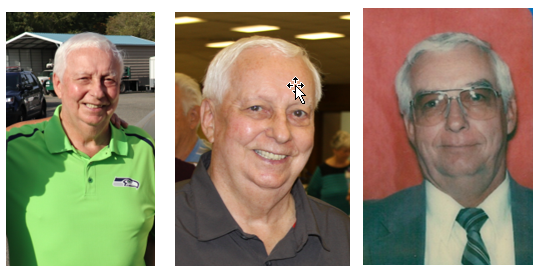
Charles Lindblom #1890, retired Seattle police captain, passed away on October 28, 2024, at 91 years of age. Charlie was born in Everett, Washington, but raised in Seattle. By the age of 16, he was working as a stock clerk in a local drugstore, laying the foundation for a life marked by hard work and determination.
After graduating from O’Dea High School alongside lifelong friend Patrick “Pat” Murphy #1653 and John Kinsella, who became a Seattle Fire Fighter Badge #797, Charlie answered the call of duty and enlisted in the Marines. He served ten active months with the 10th Infantry Battalion before transitioning to the Reserves—a common path at that time which allowed him to fulfill his service commitment until 1959.
Following his military service, Charlie embraced a variety of roles, from a mover to a heavy laborer, showcasing his unwavering work ethic while he eagerly awaited a position with Seattle.
Charlie was hired on January 2, 1959, and attended Academy Class #40. His classmates included Jim Johnson #1919, Harvey Olsen #1893, Jim Philbrick #1932, Bob Fabry #1926, Al Schrader #1897, Carolyn Byron #1853, Dean Olson #1893, Kay Kemmis #1886 and Don Daniels #1879, who organized all of the class reunions. The academy sessions were held on the second floor of the relatively new Public Safety Building located at 3rd and James. Each day, Charlie carpooled with Dick Rovig #1920, Nat Crawford #1931, and Vic Heins #1882. Unfortunately, classmates, Bob Allshaw #1925 and John Bartlett #1875, were killed in the line of duty.
Charlie patrolled downtown and was initially partnered with M.E. Dunn #491 for a time. Later, he teamed up with Dave Grayson #1814 and Michael McKinley.
Charlie had earned his teaching degree prior to coming to work at SPD. He simultaneously worked as an officer and as a math teacher at Seattle University.
In 1961, Charlie and Dave Grayson rescued a child who had fallen into a flooded crevasse at 20th Avenue South and Washington Street. The area measured 90 feet long and 30 feet wide, with water about four feet deep, making it hard for the child to stay afloat. For over a year, Charlie and Dave advocated for filling this neglected area. After the incident, they addressed the issue with the head of the Seattle Engineering Department, leading to the prompt filling of the crevasse.
By 1964, Charlie was assigned to Wallingford Station. In 1966, he was assigned as a Juvenile Investigator. The Juvenile unit operated with both day and night shifts, employing 14 detectives per shift. Charlie was working alongside Pat Murphy #1653 and Wayne Larkin #1352.
On January 1, 1969, Charlie was promoted to Sergeant, and he expressed to Captain Frank Moore #1015 that he wanted to emulate Frank's approach, to treat others as he would like to be treated.
In 1971, Charlie was recognized as one of the "Citizens of the Month" for his liaison work with the First Hill Improvement Club and the Capitol Hill Chamber of Commerce. On July 12, 1972, Charlie begun his rise through the ranks and was promoted to sergeant detective and assigned to Narcotics. He wanted a change of scenery in 1977 and was assigned to the Seattle Center. On September 25, 1978, he was promoted to Lieutenant. His promotion to Captain came on July 15, 1983, and was assigned to the West Precinct. After 26 years, on March 20, 1985, Charlie retired from the Seattle Police Department.
The day before he retired Charlie penned a three-page memo to the West Precinct Personnel. In summary, his message states: Another thing I was smart enough to do is get the hell out of the way when there’s work to be done so the workers can use their talent and creativity to do the right thing. I have a few words of advice for you which may be worth what you are paying me to give it, but: be kind to yourselves because you are the salt of the earth and deserve goodness. Don’t waste your time with petty bickering. Keep your sense of humor and don’t take yourself too seriously. Be kind to little old ladies and others who can’t defend themselves in today’s society, because you are all they have and you can’t know the trauma of being assaulted, robbed, burglarized or victimized in any way until it happens to you. The fact is, there are very few people who qualify to go out and do the job you do every day, you have no idea how good you really are!
Charlie then went to work for King County and became his lifelong friend Pat Murphy’s second in charge at the Kingdome. In retirement Charlie kept quite busy. He carded nine holes in one in golf and never missed a golfing opportunity! He dearly loved his grandkids and kept busy enjoying life. In 2011, he and Jan Brandes from the Pension office won first place at the RAP Bocce Ball Tournament, beating out Pat Murphy, who wasn’t too happy about it.
Charlie was a joyful man with a great sense of humor who brought happiness to those around him. He was dedicated to his family, community, and faith. As a grandfather, he was warm and easy-going, creating strong bonds with his 11 grandchildren. At work, he created a positive work environment and became a mentor for many.
Charlie is survived by his wife of 45 years Patti, daughters Jann Holgate and Robin Lindblom, son in-law Jeff Holgate and stepsons Kurt, Brett and Todd Harris as well as 11 grandchildren. He was preceded in death by his daughter Wendy Anderson.
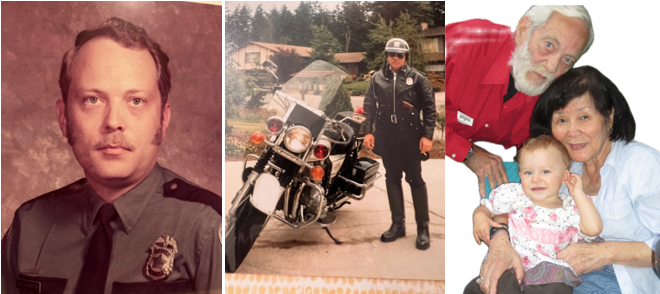
Robert “Bob” Johanson #3320, retired Seattle Police Patrol Officer, passed away on October 8, 2024, at 84 years of age.
Bob was born in Olympia but raised in Seattle. From a young age, he aspired to be a police officer. He was brought up by a single mother, and their home was always filled with music and love. His mother played the piano, he sang in the school choir, and his sister eventually became an opera singer. Throughout school, he helped supplement the household income by working at a pet store, where he developed a love for both animals and people.
In high school, Bob developed a keen interest in both aircraft and motorcycles. He joined the Navy Air Reserves and, immediately after graduating from Roosevelt High School, enlisted in the Navy, where his Military Occupational Specialty (MOS) was Military Police. Bob was stationed in Japan when he became fond of a young lady named Eiko, who worked at a dry-cleaning store frequented by military personnel. Lacking a good pick-up line, Bob attempted to impress Eiko by showing her how his handcuffs worked. To create an opportunity to spend time with her, he pretended not to find the key, joking that she would have to accompany him instead. This amusing encounter marked the beginning of their first date. Bob and Eiko married in 1963 in Iwakuni, Japan.
Upon returning to Seattle, Bob began working as a bus driver for the city while he awaited the results of his application to SPD. He also continued to serve in the Army Reserves. On January 6, 1970, Bob was hired and entered Academy Class #62. Alongside him in this class were Percy Hill #3091, Dick Chapman #3313, Gordy VanRooy #3065, Dick Carr #3323, Bill Mineo #3302, Brent Wingstrand #3317, Harry James #3050, Doug Dills #3326, Jay Nicholson #2770, Fred Hill #3299, Hank Everett #3311, and Dave Orange #3098.
Bob's first assignment was at the East Precinct during the First Watch, where he partnered with Bobby Hoff #3637. Later, he joined the TAC Squad and teamed up with Del Punton #3052. During this time, Ted Bundy was under active surveillance. Bob and his family lived in the Ravenna neighborhood, and it wasn't until years later that his children realized when their dad said they were "driving by to see if Ted was home," he was referring to Ted Bundy. In his off-duty hours, Bob worked various concerts and spent every Sunday at the Science Center. He also participated in funeral escorts as a side gig to continue riding his motorcycle. Since assignments were not recorded by the office, it is unknown where Bob was assigned as a Detective on May 17, 1976. Additionally, Bob enrolled in the LEAP Fund at the University of Puget Sound and earned his bachelor's degree in criminal justice from the university's extension campus, located on the second floor of the Public Safety Building.
On January 5, 1982, Bob returned to patrol and took on the role of an FTO, a position he truly enjoyed. Some students described him as a great teacher, organized and prepared every day. In 1984, Bob officially retired from the military after serving 14 years in the Navy and 12 years in the Army Reserves.
In the early 1990s, Bob was assigned to the Central District, an area confronted with considerable challenges, particularly in relation to gang activity and the presence of crack houses. Acknowledging the impact of frequent violent incidents on the community's well-being, Bob recognized the importance of adopting a proactive strategy in community policing. He opted to implement foot patrols while carrying a shotgun slung over his shoulder, a decision that inevitably garnered significant attention.
On the inaugural day of these patrols, the precinct experienced a substantial increase in phone calls. The captain, initially concerned by the volume of ringing phones, soon learned that the calls were largely from appreciative residents who were encouraged by the police’s visible efforts to enhance their safety. Many community members expressed their gratitude for Bob’s presence, reflecting a desire for increased engagement and support from law enforcement.
Bob's initiative not only underscored the significance of police visibility but also contributed to fostering a constructive relationship between law enforcement and the community. His approach demonstrated a commitment to collaboration and communication, reinforcing the shared goal of creating a safer and more supportive environment for all residents.
On November 9, 2000, Bob retired after 30 years and 10 months of dedicated service. In his retirement, he cherished every moment spent with his family and grandchildren. No trip to the park or school event was overlooked; these outings were filled with laughter and created unforgettable memories. Bob also found joy in the intricate art of building models, dedicating countless hours to creativity and craftsmanship. Each completed model stood as a testament to his dedication and provided an opportunity to share his passion with the younger generation.
Bob was never one to seek the spotlight; he preferred to work diligently behind the scenes. However, his dedication to the department was unwavering, and he cherished every moment spent with the SPD family. The camaraderie and shared mission filled him with pride, and he held each member in the highest regard, knowing that together they made a meaningful difference in the community.
Bob’s loving wife of 65 years, Eiko, passed away in July. He is survived by his son Art; daughter Juliet and four grandchildren.
Written by: Stephanie Coleman
Seattle Police Pension
Stephanie.coleman@seattle.gov
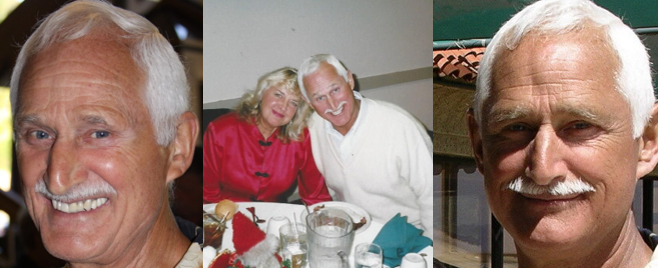
Joseph "J.J." Jankauskas #2729, retired Seattle police lieutenant, passed away on Monday, October 7, 2024 at eighty-one years of age.
JJ grew up in Beacon Hill and later moved to West Seattle. His family has strong connections to Shelton, where many of his relatives worked as loggers or in construction. This background exposed him to the industry and many trades early on. When he turned 16, he received a lunchbox and was encouraged to choose a trade. He then joined an apprenticeship program at school to become a carpenter.
After graduating from Sealth High School, JJ joined the Army at the end of 1961. Initially, he worked as a surveyor upon entering the Army. He had a school friend, Joe Dawson (King County S/O), who was in paratrooper school, and JJ thought it would be an exciting opportunity for him as well. JJ served as a paratrooper in the 101st Airborne Division and was stationed in Okinawa, Japan. He and his unit, the 503rd Airborne Infantry Regiment, were part of the 173rd Airborne Brigade, as well as the 82nd Airborne Division, where they conducted long-range reconnaissance patrols. The 173rd Infantry Brigade was activated in Okinawa in 1963 as the 173rd Airborne Brigade, which was commonly known as the "Sky Soldiers." The 101st Airborne Division is recognized as one of the U.S. Army's most agile and combat-ready forces, specializing in rapid deployment and air assault operations.
After being discharged from the Army in 1964, JJ returned to Highline Community College for two years, where he earned his journeyman status as a carpenter. While working as a carpenter, JJ considered joining the Fire Department. However, he learned that the SPD was hiring so he applied and was hired on July 24, 1967. When asked why he wanted to become an officer, he responded, “Cops were the good guys.” When asked why he chose SPD, he stated, “Childhood dream.”
When JJ was hired, there was not an academy class available for him to attend, so hearing of his carpentry talents, JJ was given some carpentry jobs as he waited. By the time Academy Class #54 started on December 4, 1967, JJ was more than ready to begin his new career. Some Academy mates include Chuck Harris #2459, Gary Bille #2745, Al Gerdes #2738, Dennis Hanks #2764, Jim Luedeke #2780, George Marberg #2784, Dan Engle #2777, and Dennis Nixdorf #2778 amongst others. JJ was assigned to Patrol on July 24, 1967. At some point in the early 1970s, JJ became a member of the TAC Squad. Following a sniper shooting incident in Texas, Chief Ramon #641 approached Jim "Poopsie" Parker #1843 and Carl Sandbeck #1841, stating that the department needed a marksman. At that time, the department only had shotguns and no rifles. A group of TAC officers, including JJ, was sent to Washington D.C. for marksman school, which became the start of the Emergency Response Team (ERT), as Chief Ramon believed that the title SWAT was too flashy. In the early 1970s, JJ encountered Terry Augerson #3246 at the range. Terry mentioned that his hunting partner was unavailable for the year. JJ offered to team up with him, sharing that his hunting buddy was also out for the season. This was what they thought marked the start of their friendship. After about three years, JJ left the TAC Squad. He eventually moved to the South Precinct and partnered with Mike Smith #3090, serving as 1R1, alongside Sgt. Ray Gonsted #2172 and Lt. Morey Skaret.#406. While in Patrol, JJ continued his education through the LEAP Program and earned his bachelor's degree in public safety from Seattle University.
On August 10, 1978, JJ was working off-duty at the QFC on Broadway, shortly before closing time. Carl Matsumoto #4614, the head of the night stocking crew, observed that the back door was ajar while awaiting the arrival of delivery trucks. Driven by curiosity, he stepped outside to check for the truck, only to discover as he was coming back inside, a man armed with a gun compelling two store employees to the back of the establishment. The suspect then inquired if the police officer was present that night. Carl immediately ran outside to the front of the store to inform JJ about the armed individual. Just as Carl was relaying the warning, the suspect emerged from the back and began firing towards the area where the off-duty officers typically stood. Carl ushered everyone out of the store through the front entrance. Meanwhile, the night manager, Dennis Tangborn (Snohomish County Sheriff’s Office), was securing cash in the safe and was on the phone with 911. Assuming cover, JJ identified himself as a police officer and commanded the suspect to drop the weapon. The suspect, however, disregarded the order and continued firing, narrowly missing JJ. Dispatch had units enroute after hearing shots fired. JJ fired three shots and reloaded his .357 Magnum while seeking cover, as the suspect concealed himself behind a display of "Leggs" pantyhose, highlighting the critical distinction between cover and concealment. JJ reloaded after every second shot, mindful that the suspect may have had accomplices. Responding officers and supervisors later recounted JJ's remarkable composure and calmness during the incident. The suspect succumbed to his injury’s days later, and an inquest ultimately cleared JJ of any wrongdoing. Numerous individuals later expressed that they believed JJ had saved their lives that day. When asked if this incident motivated either Dennis or Carl to pursue a career in law enforcement, Carl attributed his decision instead to a bet made by JJ and Jon Olson, who told him he could never successfully pass the SPD test. Dennis had been a reserve officer with Mountlake Terrace at the time, eventually retiring from Snohomish County S/O.
By 1979, JJ was working the first watch at South Precinct in the West Seattle area. He was promoted to Detective on January 30, 1980. His first assignment as a detective was with the General Assignments Unit, which at the time was essentially focused on Fraud and Explosives. On June 18, 1980, JJ was promoted to Sergeant and continued in the Fraud & Explosives unit, which later became known as the Bomb Squad. In March 1982, during his second year in this assignment, JJ, Sgt. Rod Jackson #1196, and Danny Barrett #2948 responded to a bank robbery where a teller had a bomb strapped to his leg by the suspect. JJ successfully removed the bomb, wrapped it in several telephone books, and placed it in a bomb basket. Rod instructed JJ and Danny not to get the bomb trailer, as it would take too long to arrive at the scene. Instead, they would transport the bomb to the range while maintaining radio silence. On the way to the range, the police radio continually attempted to contact them. Rod told Danny to answer it, and when Barrett keyed the mic, the bomb exploded. The car was instantly filled with confetti from the phone books, impairing their sight and hearing. Weeks later, Danny arrested the suspect, a Canadian who had used the same method to rob other banks. Unfortunately, Barrett never fully recovered his hearing and subsequently retired, while JJ continued working with impaired hearing. JJ remained in the bomb squad until December 1990, when he transferred to the Internal Investigations unit. Shortly after, he was assigned as the West Precinct Patrol Sergeant under Dick Schweitzer #3041 working alongside his good friend Joe Parks #3318.
Around 1994, JJ's parents were facing health issues, and JJ became their primary caretaker. He relocated to Shelton to be with them, and despite the daily commute to Seattle for work, he never wavered in his commitment to his parents. On June 1, 1997, JJ was promoted to Lieutenant and was assigned to replace Jerry Adams #2010 as the 3rd Watch West Commander. Around this time, JJ had property in Shelton, clearing stumps to build a beach house, which he built and installed everything except the electricity. Later, he ventured into renovations, buying a duplex, he lived in one side while renovating the otherside and used that equity to purchase more. Repeating the process and becoming a landlord while working full-time.
In 1999, JJ's was introduced to Melissa through a mutual friend. Although they lost touch for a while, their paths crossed again in January 2001, and six months later, they married. When asked how he met his spouse, JJ fondly wrote, “you meet quality people through quality people.” JJ was working First Watch West Relief and after 37 years of dedicated service, JJ retired on July 28, 2004. With a steady demeanor JJ took pride in his work, always feeling that on Patrol was where he truly made a difference helping those in need. Among the many supervisors he had throughout his career, Lt. Frank Ottersback #835 stood out as a guiding light, offering wisdom and support that JJ would always carry with him. When asked the most rewarding thing he had ever done, JJ replied “retire.”
In retirement, JJ kept quite busy. Described as the “all-purpose man” by his father-in-law, he could fix anything! He was also very adventurous, throughout his life he was camping, fishing, skiing, deer and elk hunting. He loved hikes, often confidently asserting that he knew the way, even if he sometimes didn’t. He often hiked through the Olympic Mountains, discovering hidden trails and breathtaking views. His wanderlust took him on several trips across North America, even to Newfoundland and Alaska. In fact, during one of those adventures, he cleverly devised a way to transport his 14-foot Livingston boat atop his truck while taking the Alaska state ferry, so he could fish to his heart's content wherever he camped. But foremost, his family was always at the center of JJ's world. He cherished every moment with his loved ones.
In 2010, JJ casually informed Terry Augerson that they had in fact, known each other since infancy. Their parents happened to be friends who lived nearby during their early years, often gathering to enjoy games of pinochle while the two infant boys (JJ and Terry) played on a blanket nearby. Remarkably, JJ had mentioned Terry to his parents back in the 1970s, and they shared this information with JJ, however, due to JJ's reserved nature, he did not share this connection with Terry until four decades later.
JJ was known for his respect and kindness towards others. He treated everyone he encountered with warmth and consideration, making them feel valued and appreciated. His actions reflected his genuine care for others, and his legacy of kindness will continue to inspire us all.
JJ is survived by his loving wife Missy; five daughters, Jessica, Jennille, Sabrina, Crystal, and Tanya; and 11 grandchildren.
Written by: Stephanie Coleman
Stephanie.Coleman@seattle.gov
Seattle Police Pension

Michael Ferry #4442, Retired Seattle Beat Patrol Officer, Armorer, and Instructor; passed away September 18, 2024 at 73 years of age.
Mike was born and raised in the Beacon Hill area of Seattle. He was very active in the Boy Scouts, rising from Cub Scout through each level, achieving the rank of Eagle Scout. Mike graduated from Cleveland High School and attended Washington State University where he received a Bachelor of Science in Criminal Justice. During the summers, he worked at Diablo Dam alongside his father, Frank, who was an electrical engineer and had been employed by Seattle City Light for 37 years.
Mike started his law enforcement career on April 1, 1974 with the University of Washington Public Safety Office. He graduated from Academy Class #74 along with Ken Condor #4077. Mike had always dreamed of working for Seattle PD and was hired by SPD on May 29, 1980. He briefly worked the East and South Precincts but found his home working David Sector beats (D90) from 1983 until 1995; some of his beat partners included Ken Conder #4077, Bob Vallor #4695, Pat Wallace #3469, Ernie Hall #4792 and Greg Pote #4257,
Back in the mid-1980s, Mike was living in Ballard when he decided to swing by the local dry cleaner to pick up his uniforms. However, when he arrived, he found three of his uniforms hanging on the racks, but the door had a padlock on it with a "Bankrupt - Closed" sign. Talk about a problem! The uniform allowances didn’t cover the cost of one uniform, let alone three, which presented a problem; Mike needed more than one uniform a week and found himself in a bit of a situation. He had to go tell his Sergeant Bernie Miller #2454. You can imagine Bernie’s response.
Debbie, one of Mike's friends, knew Mike was an avid outdoors man and loved backpacking. Debbie got tired of her friend, JoAnne dragging her out on backpacking trips. One day, after a grueling hike, Debbie exclaimed “I know the perfect person for you!” and introduced Mike to JoAnne. They eloped to Reno where they were married in 1987.
Around 1994, Mike put himself through several firearm armorer certifications, including the Glock Armorer Certification. He was vying for his dream job at the range. Mike was assigned as the Armorer in 1995. Mike worked alongside Drew Dowd #3447, Rick Hinz #3950, Tammy McClincy #4905, Curt Wilson #4505, Pete Verhaar #4329, Ken Saucier #4922, AC Torrescano #4743, they amongst others saw the department through transitions such as the revolver to auto pistol, Street Skills, and the Shotgun program. As an instructor, Mike was always one to encourage the students. Sometimes, when he felt that someone just needed a boost to overcome their own mental block, he would use reverse psychology by saying there was no way something could be done, just so the student could prove him wrong.
Additionally, Mike became a certified federal weapons inspector. As a federal contractor, he would certify and inspect a local federal agency officers’ weapon. Effectively eliminating any days, the armed agents went unarmed.
Mike remained in his dream job, at the Range until he retired on June 30, 2011 after 37 years of law enforcement service.
In 2011, Mike bought a retirement home in Las Vegas. He and JoAnne planned to retire in a warm, dry and sunny location. Mike spent his retirement years basking in the sun, swimming in the pool, shooting his antique Thompson submachine gun at the local range, and becoming an expert BBQ chef.
Mike enjoyed music, dancing, and the lively company of his friends. He spent several years on the annual weekend trip to Reno, as part of a large group of David Sector friends which was organized by Fred Ibuki #3982.
Throughout his life Mike was an avid outdoors man, Mike enjoyed the wilderness, hiking, camping, boating, skiing, and mountaineering. His summit of Mount Rainier was one of those adventures. Outgoing by nature, he also kept a low profile and was a quiet force out on the street. Mike always had an interesting and sensical view of the world, marked by a great sense of humor and a sharp wit.
Mike is survived by his wife, JoAnne Marzowski, his sister, Jennifer Woods (husband Rick), his nephew Michael Woods (wife Beth Toyofuku). He was preceded in death by his parents, Anne and Frank Ferry.
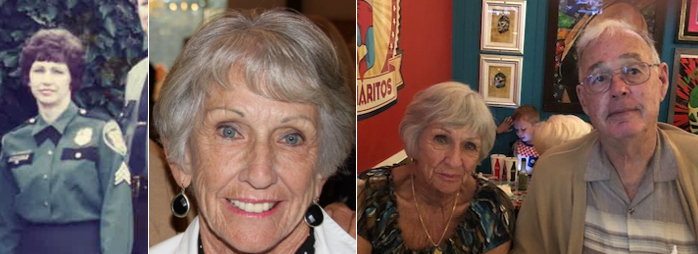
Jeanette "Jan" Engle #2388, retired Seattle police lieutenant, and wife of retired detective sergeant Dan Engle #2777 passed away on August 14, 2024 at 86 years of age.
Jan was born and raised in Detroit, Michigan on a farm, she later moved to the Seattle area, where she worked as a secretary for Boeing, a job she did not enjoy. On January 20, 1964, she applied and was hired as a policewoman. She was assigned to the "Women's Bureau," which had been established in 1912. SPD was the first law enforcement agency in the United States to hire policewomen. While female officers received equal pay to their male counterparts, women were initially required to have a four-year college degree. However, this requirement was dropped just before she was hired.
In May 1965, Jan was assigned, along with Barb Grout #2290, to investigate a juvenile female. During the investigation, a newspaper clipping was found in the teen’s purse that reported on two stolen nightsticks and damage to a showcase in the PSB that occurred in February 1965. After further inquiry, contact was made with three male acquaintances. Two of the boys came clean, admitting they were responsible for the theft and the damage to the display case. And just like that, the mystery of the stolen nightsticks ended!
On July 12, 1965, Jan had been working for a year and a half before entering academy class #49, along with John P. Sullivan #2184, Paul Lewis # 2288, John Erickson #2446, Helen Hendrickson #2444, Bill Wald #2488, Gary McLenaghan #2458, Ken Starkweather #2441, John Boyer #2490, Bernie Miller #2454, Jerry Bickel #2487, Jerry Hicklin #2497,and Jim Armstrong #2468.
In mid-1968, Jan was assigned to the Narcotics Unit. She was the first female undercover Narcotics Officer in SPD. Others assigned to the unit were Jack Gottwig #1652, Jim Armstrong #2468, Bob Fabry #1926, under then Lt. Dave Grayson #1814.
The Women’s Bureau officially closed in 1969, and all 23 policewomen were reassigned to various follow-up units. Pat Lamphere was paired with Jan in the Narcotics division. The role of women in law enforcement was changing, and historically, very few women had been involved in narcotics enforcement. In response, the Bureau of Narcotics and Dangerous Drugs (now the DEA) offered a two-week class in Washington, D.C., for women working in drug enforcement across the United States. Jan and Pat were selected by the department to attend this class.
On January 1, 1970, Jan was promoted to Detective. In 1971, Jan infiltrated a notorious narcotics ring for six intense months. She very skillfully posed as a dealer. Her undercover work led to a significant crackdown, resulting in 15 arrests, including six major suppliers in the Northwest. Among those, one individual was handed a 30-year sentence. During the operation, Jan facilitated drug purchases averaging between $100 and $1,500 a day, the equivalent of $785 to $11,895 in today's currency. The investigation culminated in a nine-day trial that secured six convictions, marking a pivotal victory in the fight against drug trafficking. By 1972, the Seattle Times declared that the local heroin ring was “in shambles,” a testament to Jan's relentless efforts. In recognition, of her bravery and dedication, she was honored by Attorney General Slade Gorton, solidifying her legacy in the battle against narcotics crime. She was also recognized by SPD as the “Policewoman of the Year”.
In 1972, Jan worked with the "Fencing Squad" alongside Dick Ingertila #1790 and Paul Meyer #2560. On December 6, 1976, she was promoted to Sergeant Detective. Although not all of her assignments are documented, she served as an instructor for Academy Class #80. Between 1977 and 1978, Jan transitioned to the Robbery Unit. On April 9, 1980, she was promoted to Lieutenant and assigned to the South Precinct. In 1982, she transferred to the Intelligence Unit and attended the FBI Academy. After completing her training, Jan returned and transferred to the North Precinct.
Jan married Dan Engle #2777 in 1984 and a few years later, they started thinking about retirement. Both wanted to learn how to fly, so they enrolled in flying lessons. In 1988, Carl Olson # 2308, along with Jan and Dan, developed an interest in a five-year-old racing horse named "Jan's Grey Pop." Initially, Jan and Dan believed that investing in the horse would provide them with significant tax benefits. However, as it turned out, their anticipated tax advantage was not as beneficial as they had hoped, especially after they factored in the horse’s winnings, which included $53,000 from the Labor Day Handicap and $30,000 from the Mile Race.
After 27 years of service, Jan retired on February 6, 1991. They set their sights on moving to Hawaii. After retiring, they decided to embark on some adventures, purchasing a luxury pontoon houseboat to explore for two months; they traveled from Washington north to Canada and Alaska. In 1992, they moved to their macadamia and coffee farm on the Big Island of Hawaii, where they lived for ten years. During this time, Jan obtained her real estate and property management license, eventually becoming a broker while Dan worked security at the Kona airport. In 2004, they were ready to stop farming and started to build a new home. Dave Sorensen #3441, who also worked with Dan at the airport, helped them with the construction. They built a house above the Captain Cook Monument, which offered stunning ocean views. Around 2010, they moved to Kona, where they continued to enjoy ocean views.
In retirement Jan and Dan traveled extensively, visiting destinations such as Europe, South America, Ecuador, the Galapagos Islands, Costa Rica, Ireland, France, Michigan, and Washington state.
Jan passed away on August 14, 2024, at the age of eighty-six. She will be remembered for many things, particularly her role as a leader and mentor. While she would often admit that she wasn't a great driver or an excellent shot, her exceptional skills as an undercover cop were evident to all who knew her. Jan left a lasting impact on the lives and careers of many, and her influence extended beyond the badge, shaping the next generation of officers who aspired to follow in her formidable footsteps.
Jan is survived by her loving husband of 40 years, Dan; her daughter, Kimberly; two stepsons, Steve and Chris; Granddaughters, Angela, Dora, Sophie, & Chloe and Grandsons Parker and Samuel; and two great-grandchildren. She is also survived by her sister, Nadine, and her brother, Ed. Jan was predeceased by her son, Michael.
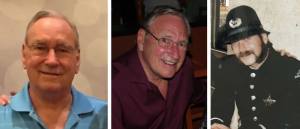
Timothy Hubbard #2925, retired Seattle police detective, passed away on August 4, 2024 at seventy-seven years of age.
Tim was born and raised in the North City area of Seattle. He graduated from Shorecrest High School and immediately enrolled at Shorelin Community College. While attending college, Tim knew that he better choose a military branch before the military chose one for him so at 20 years old, with an AA degree behind him, he joined the Marine Corps Reserves. His MOU was Combat Engineer. Tim would jokingly say he went in a scrawny kid and came out a man.
Tim had always had a heart of service. He had seen the hiring advertisements and applied to Seattle. On June 11, 1968, Tim was hired as a Cadet, and six months later he entered Academy Class #58, alongside Marilyn McLaughlin #3016, Mike Brasfield #3020, Kerry Guynn #3019, Frank Kampsen #2769, Mike Broyles #2865 and Dick Niemiec #2991, Ron Testerman #2593, John Kriney #2990, Tom Blair #2998 amongst others.
Tim was assigned to Patrol, where he partnered with Ralph Stewart #2873. After spending four years in Patrol, he was appointed as a Helicopter Observer on April 1, 1972. At that time, he also retired from the Marine Corps Reserves after six years of service.
Tragedy struck the Helicopter Unit on June 21, 1974, when SPD “Air Three” Pilot Jim St. DeLore #3341 and observer Jim Forbes #3184 lost their lives in a midair collision. On August 17, 1977, amidst the looming uncertainty about the department’s helicopter program, Tim returned to Patrol. It is unclear which precinct Tim was assigned to at that time.
On June 27, 1978, while working off duty for the Japanese Consul at Pier 70, the first of the Tall Ships had arrived for Seafair, the Nippon Maru. Tim found himself in the midst of a deeply tragic event when an 8-year-old boy fell 25 feet from Ship into the waters of Elliott Bay. He was trapped between the ship and a barge. In a moment of bravery and selflessness, Tim, a Seattle firefighter, and a civilian leaped into the water, in a desperate hope to rescue the boy. Despite their exhaustive search and unwavering determination, they could not find him. This heartbreaking outcome weighed heavily on Tim's heart, The sorrow from that day stayed with him for years. It reminded him how fragile life is and how strong our human connections can be.
Around 1980, Tim was assigned to the West Precinct and was partnered with Fred Kilmer #2573 and John P. Sullivan #2184 in the "Pioneer Squad." Officers assigned here were issued 1910-style uniforms to wear during the peak tourist season. The program was designed to promote positive interactions between citizens and the police.
On January 1, 1981, Tim was promoted to Detective and joined the anti-fencing unit with Bob Little, Ron Aslett, Terri MacMillan, Hank Everett, Eddie Rivera, Jay Nicholson, to name a few. After two years, he moved to the Narcotics Unit and advanced to the DEA Task Force with Dennis Tichi and Kevin Mason. In 1994, Tim joined the SEAFAT, working with Manny Washington, and received commendation from the FBI Director for resolving a case on "America's Most Wanted."
On June 11, 1996, Tim decided to retire after 28 years of service. Shortly after his retirement, he was back at it, this time working as a Seatle Municipal Court Marshall for Joe Sanford #1896, Rudy Sutlovich #2544, Jerry Trettevik #2155, and John Richardson #2180, to mention a few.
In 2003, Tim was sitting in the lobby of the Red Lion in Bellevue when a group of audiologists gathered for a continuing education class. He noticed a woman looking at him and did a double take. They both felt a sense of familiarity, but she hesitated to approach him because she had previously worked with him at the DEA and wasn’t sure if he was currently involved in a case. When he smiled at her, his expression brightened, and eventually, they began dating. In 2005, Tim and Sandy got married.
This time, Tim embraced retirement with anticipation. On June 14, 2006, he bid farewell to the Seattle Municipal Court, marking the conclusion of a ten-year journey of service and a 38-year career in law enforcement.
In retirement, Tim traveled extensively, exploring Europe, the Caribbean, Hawaii, Mexico, and various locations throughout the United States. He often reflected on this time, stating, “I was truly the happiest I have ever been in my life” being on a river fly fishing.
In 2016, Tim was diagnosed with pulmonary fibrosis, which severely limited his mobility and led to him being placed on the transplant waiting list. Just 65 days later, on October 18, 2017, Tim was given a life-changing double lung transplant at UC San Francisco. A year post-transplant, he completed a 5K event to honor his donor and became a passionate advocate for organ donation, sharing his story to emphasize the importance of organ donation.
Tim often expressed heartfelt gratitude for every moment of the seven years he was given post-transplant. At 77 years of age, Tim passed away on August 4, 2024.
At the core of Tim’s life was an unwavering love for his family and friends, a deep appreciation for the great outdoors, and to live a simple life. Tim's legacy is one of immense kindness, courage, and a commitment to living life to its fullest.
Tim is survived by his devoted wife, Sandy, with whom he shared 19 beautiful years, as well as his son David and daughter-in-law Nicole, and his cherished grandchildren, Austin and Riley.
Written by: Stephanie Coleman
Police Pension Office
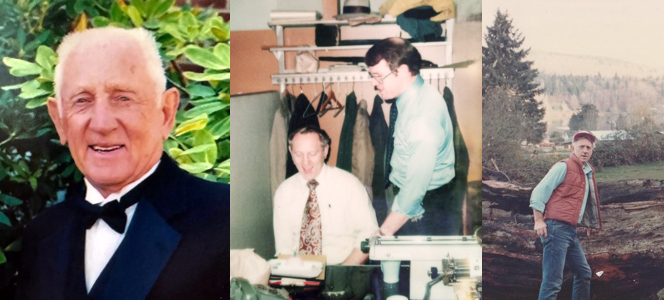
Maury Erickson #2063, retired Seattle police detective, passed away on July 10th at 91 years of age.
At six weeks old, Maury moved with his family from Iowa to Fir Island in Skagit County. Maury grew up on the farm and once he graduated from High School, he enlisted in the Air Force. His MOU was Communication Specialist. During the Korean War, Maury was stationed on a hillside, tasked with establishing and maintaining communications that allowed various forces to communicate.
After serving four years in the Air Force, Maury discharged and went to work as a truck driver. During the late 50’s and early 60’s Seattle was hiring for the World’s Fair. It is suspected that this may be what drew Maury to apply to SPD.
Maury was hired on July 25, 1960 and entered Academy Class #42 along with Paul Jasperson #2082, John Larson #2060, Shaun O’Kinsella #2076, David Green #2070, Harold Fogus #2061, Dean Murphy #2068, Gerald Barman #2083, Richard Hutchison #2074, Don Turner #2071, and Richard Auve #2072, to name a few.
Maury was assigned to patrol duties for the next nine years. A news article from 1965 lists Clark Elster #2025 as a partner in the Central District. On April 24, 1969, Maury was promoted to Detective and assigned to the Robbery Homicide Unit, where he worked alongside Jack Wallock #2250, Al Gerdes #2738, Myrle Carner #2810, Phil Forsell #2323, and Bill Karban #2342, among others.
Maury was laid-back, but he enjoyed a good joke, whether he was telling it or on the receiving end. Myrle Carner wasn’t Maury’s partner, but they worked together in homicide and robbery. One day, Maury arrived at the office with a nice gift package tied with a pink ribbon. Assuming it was a gift for Robin, whom Maury was dating, his coworkers asked him about it. He replied in his typical slow, methodical manner, “It’s just a gift.” After that, Maury headed down to Ivar’s for lunch. As soon as he left, Al Gerdes and Myrle exchanged glances and said, “Do you want to see what he got Robin?” They broke out their homicide kits, carefully dissected the package, and measured everything, including its position on Maury’s desk. When they opened it, they discovered a nice leather purse. Then they decided to switch it out for an old, ugly purse that they filled with outdated reports before resealing the package.
When Maury returned, his colleagues said, “Maury, we took an office vote, and we want to know what’s in the package.” He insisted, “It’s nothing special, just a gift.” As they approached him—Maury was very low-key—Myrle got about 25 feet away, opened the package, and pulled out an ugly purse. “You’re really going to give this ugly thing to Robin?” he exclaimed, then stepped on the purse and ripped one handle off. Al followed suit and tore off the other handle. Maury stood up slowly and said “All right, that’s just about enough!” They filled him in on the prank, and they all had a good laugh. It was fortunate they did, because it turned out that Maury needed to put the gift back together. As the head of their Moose Lodge #42 had passed away, and they were scheduled to present the wife with the purse that night.
In the 1970’s, all detectives wore suits and ties. Maury, along with Al and Myrle went to serve an arrest warrant for a suspect, and when we knocked on the door, the suspect answered. As we stood there explaining the warrant, the suspect grabbed Myrle by the tie and began choking him. It wasn't a breakaway tie. Maury stood by for a moment and slowly responding said, “Well… that’s just about enough.” And knocked the guy out with one punch!
Phil Forsell was Maury’s actual partner. Maury, Phil and Myrle went to serve an arrest warrant on Capitol Hill. We set up a perimeter and knocked on the door, announcing the warrant. The house was an old hippie house. Very dark inside, lit by a single red light in the ceiling. As we entered the house, it was hard for our eyes to adjust from the bright sunlight outside to the almost pitch dark inside. Myrle heard Phil yell, “Freeze!” while someone was bolting out to the back door. Al Gerdes and Myrle went out onto the back porch, where Phil had his gun pointed at the men on the ground. Meanwhile, Maury stood there, pointing his finger at them as if it were a gun. Myrle quietly whispered to Maury, “Maury, where’s your gun?” to which Maury replied, “Oh, I left it at the office.”
Maury commuted in an old “Columbo car” probably a Dodge Valiant with 370k miles from Lake Cavanaugh to the office daily and would often mention that he would retire after 20 years. Just after hitting that milestone, Maury came into the office, said, "well, it’s been nice working with you boys," packed up and turned in his gear. He retired having served just over 20 years, on September 5, 1980.
In retirement, Maury tended to the small farm with cows, horses, and vegetable and flower gardens. He and his wife, Robin, loved to travel. They visited all 50 states, mostly in an RV, including a trip along the Al-Can highway to Alaska. They also traveled to all seven continents, enjoying RV trips, cruises, and his favorite destination, Hawaii. On a trip to South Africa, Maury and Robin stepped in to help a couple struggling with their rented RV.
Understanding the importance of everyone enjoying their vacation, Robin drove the couple's RV while Maury drove theirs. This thoughtful gesture ensured that all could continue their adventures together, making the most of their unforgettable experience.
Twelve years ago, Maury formed a meaningful friendship with Mike Brady #4181, at their church in Stanwood, a bond that lasted until Maury’s passing. Their time together was filled with joy as they shared donuts and tackled various projects. One memorable occasion involved jumping a car battery, which led to some entertaining sparks that highlighted their fun-loving spirit.
Maury exemplified honesty, which fostered a strong sense of trust in his relationships. His genuine care for people demonstrated the importance of empathy in building meaningful connections. Over the years, he actively kept in touch with many friends, highlighting the value of nurturing and maintaining those relationships.Maury is survived by his wife of 49 years, Robin, sons Paul, Mark, Rob, and Jay, six grandchildren, and six great-grandchildren. He was predeceased by his son Phillip and his first grandchild, Steven.
Written by: Stephanie Coleman
Police Pension Office
Stephanie.Coleman@seattle.gov
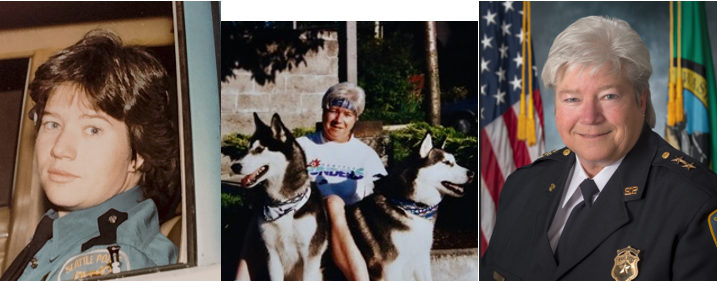
Robin L. Clark #4507, retired Seattle Police assistant chief, passed away on June 22nd, 2024, at the age of 65.
Robin was born in Suffolk, Virginia. She lived in Ohio before moving to England at 16 with her mother and two siblings. In 1975, the family moved to Seattle to be closer to family. After graduating from Shoreline High School, Robin was hired by the City of Seattle Parks Department to work as a Recreation leader and basketball referee at Hiawatha Community Center in West Seattle. This is where she met two young spirited boys, Nick #5824 and Joe #5334 Bauer. Robin was a no-nonsense rec-leader who influenced many youths. She organized basketball, flag football, and tennis matches. She spent hours with the kids and made the older kids watch out for the younger ones. She even arranged for a Hapkido instructor to hold classes and would give out passes to the kids who couldn't afford to pay.
An SPD commander encouraged Robin to apply to the Seattle Police Department and Robin was hired on October 1, 1980, and entered academy Class #129 with Curt Wilson #4505 and Janet Benn #4506, among other recruits.
Robin was assigned to 2nd Watch relief squad, East Precinct. Her sergeant was John Moffat #3522. By 1983, she was working 3rd Watch East. In August 1984, the Columbia City and Mount Baker areas experienced several knife-wielding rapes that terrorized the region. Each assault presented a greater degree of aggression. These assaults included either a gun or a knife. The burglar would enter a home while victims slept. In July 1985, the suspect was arrested; a painter, Curtis Thompson, admitted to 40 plus burglaries and was charged with five counts of rape one. After serving his time for those crimes, in 2003, he was held and tried under the state's civil commitment sexually violent predator law, and the jury believed he had been saved with his rediscovery of faith and good behavior throughout the years in prison. A year later, a weeklong spree ended when he was arrested after raping one victim: two attempted rapes, and the death of his final victim.
Robin was encouraged to take the detective's exam because of her investigative abilities. She was promoted to Detective on January 2, 1985, and assigned to the Special Assault Unit. Having just come from Patrol, Robin was determined to be a proactive detective and was partnered with Jodie Russell Averett #4393, they were nicknamed “Cagney & Lacey”.
From November 28 to December 18, 1986, another series of rapes known as the "Harborview Rapist" occurred between Harborview Hospital and Seattle University. The suspect, a high school basketball star attending Seattle University, was identified by three of his victims and subsequently arrested and charged with these crimes.
On January 21, 1987, Robin was assigned to the Green River Task Force, where she collaborated closely with SPD Detective Joe Higgins #3981 and King County Sheriff's Detective Fae Brooks and Dave Reichert. A pivotal moment in the case occurred when Dave, Robin, and Fae visited the suspect's house. He permitted them to conduct a search and agreed to a cheek swab using a piece of gauze to chew on. Years later, thanks to advancements in DNA testing, the DNA was re-examined, which led to the pivotal conviction of Gary Ridgeway for multiple murders.
Following her Green River Task Force on February 9, 1989, Robin briefly worked in Burglary Theft before transitioning to Background Investigations on May 3, 1989. On December 19, 1990, she was promoted to Sergeant Detective at East Precinct Patrol and remained there until March 30, 1993. Robin then transferred to the Special Activities Section, where she led a federally funded school emphasis team, collaborating with Alex Wiggins #5269, John Heneghan #5033, and Tawnia Pfaff #5500. On September 20, 1995, she was assigned to Internal Investigations Unit.
A week after her 39th birthday, Robin was diagnosed with Breast cancer. On April 14, 1999, Robin was assigned to the Operations Bureau, and on January 5, 2000, she was assigned to SWAT. One critical incident during her SWAT assignment involved a call-out to Clallam County, where a deputy had been killed, and an armed suspect was barricaded. Seattle SWAT was deployed to relieve WSP, and Robin's handling of the usual interagency "politics" calmly and strategically reassured everyone involved. Robin emphasized that they would negotiation and make tactical decisions to facilitate a peaceful surrender. The suspect was apprehended without firing a shot, which impressed everyone who witnessed it.
Not long after the notorious North Hollywood shootout, Robin established a comprehensive training programs and collaborated closely with regional SWAT teams, including LAPD SWAT, to share best practices and enhance collective capabilities. This initiative empowered many SWAT teams, and SPD was regarded as the nation's premier unit.
On January 1, 2003, Robin was assigned to the North Precinct Lieutenant 2nd Watch. She continued in that role until transferring to the Traffic Motorcycle Unit on July 6, 2005. She and Bob Robbin #4351 became "partners in crime." During one particular special assignment, they encountered numerous difficulties with the promoters. Bob suggested to Robin, "Let's go to the zoo." She gave him a knowing look and replied, "Yeah, let's go!" It had been years since they had visited, so everything felt new to them. Robin started sending Don Smith #4258, who was on a separate assignment, pictures of her and Bob together with animal statutes behind them. They eventually lost count how many times Don asked, “where are you”!
On October 1, 2008, she was assigned as the North Precinct Admin Lieutenant. Robin had participated in the Race for the Cure with the Susan G. Komen Foundation for several years by this time. On June 7, 2009, she was honored to be asked to serve as the Grand Marshal for the parade, leading the event in this special role during the parade.
On December 23, 2009, Robin was promoted to Captain and assigned to the North Precinct. She remained in this position until Interim Chief Harry Baily #2930 promoted her to Acting Assistant Chief and assigned her to the Special Operations Administration. Robin was again promoted on August 14, 2014, to Assistant Chief and transferred to the Criminal Investigations Bureau, where she served until a new command staff was appointed. Amongst others, Robin returned to her previous rank of Captain on March 25, 2015, and transferred to the Homeland Security unit. On August 24, 2016, she was assigned as Major Crimes Unit Captain.
In 2018, ex SPD Captain Mike Washburn #5081 was sworn in as the Chief of Police for Indio, California, which Robin and Pam attended, and they fell in love with the area. They bought a condo and would visit as much as they could between a busy work schedule and life. In 2019, Robin received her second diagnosis of breast cancer.
On September 30, 2022, after 42 years of service, Robin retired. She noted that some of her most fulfilling assignments were "The Columbia City Child Rapist," the "Harborview Rapist," and the Green River Task Force. She also took great pride in her role as the SWAT commander and her involvement in the development and training for Problem-Oriented Policing. Just after retirement, Robin and Pam moved permanently to California and started to enjoy retirement life.
Outside of her professional life, Robin was an avid cyclist; she loved her big husky dogs, outdoor movie nights, pumpkin carving contests, planning BBQs, and the community that she lived in for 20 years. Traveling to their special place in Hawaii, you will find Robin in the ocean, watching whales and snorkeling. She was also on the Seattle Blue Women's Softball Team which represented SPD, alongside Deb Nicholson #4981, Deb King #4097, Ann Martin #4579, Fran Smith #4952, Liz Allen #4686, Brenda Burrows #4458, Terry Duffy #4217, Barb Wilson #4705, Lis Eddy #4204, Rose McMann #4202, Judy Harwood #5067, Rose Bass #4356. In 1984, the team took first place at a tournament at Pacific Beach, Washington, in a game of one to zero.
In the spring of 2024, Robin's courageous fight against cancer faced a challenging turn when it metastasized. Yet even in adversity, Robin's strength and spirit shone brightly until the very end on June 22, 2024.
Robin was not just an inspiring leader but a beacon of hope for those grappling with the harsh realities of cancer. Her compassion knew no bounds, and her commitment to those affected by breast cancer was heartfelt and genuine. Whether the struggle belonged to the patient or their loved ones, Robin made it her mission to reach out with unwavering support. In her presence, people found a rare combination of empathy and strength. She reassured them they were never alone; to several, her solidarity was a lifeline during their most challenging moments.
Her passion for policing was equally powerful, driving her tireless efforts to improve the lives of others. Robin's relentless pursuit of excellence in law enforcement led her to achieve her role as Assistant Chief, but what set Robin apart was her extraordinary ability to lead from the front. She stood for the good of all, not just a few. She was a commander who believed in the power of action side-by-side with her officers during high-stakes calls and significant incidents.
However, her true legacy lies in her unwavering commitment to empowering others in law enforcement. Robin didn't just mentor; she uplifted and inspired, creating pathways for supervisors and commanders to thrive. Her influence was profound, and her presence echoed throughout the ranks. With a leader like Robin, you felt an undeniable urge to follow her anywhere, knowing she led with integrity and purpose. Furthermore, her courageous mentorship extended to those facing cancer, demonstrating unparalleled resilience and unwavering solidarity, making her a guiding force in every aspect of her life.
Robin is survived by her devoted spouse of 33 years, Pam McCammon #5474; siblings Debbie, Jackie, Marty, and Mark; and her beloved Ryder.
Written by: Stephanie Coleman
Seattle Police Pension
Stephanie.coleman@seattle.gov
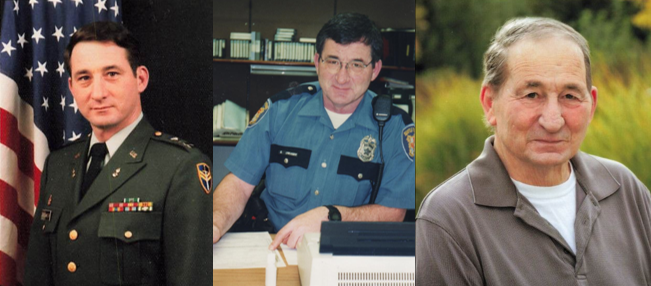
Bruce M. Creamer #5910, Retired Seattle police sergeant passed away on May 27, 2024, at 74 years of age.
Bruce was born and raised in the Midland (Tacoma) area. Growing up, he was active in the Boy Scouts and played high school football. After graduating from Franklin Pierce High School in 1967, Bruce entered the US Navy and was sent to Vietnam on a submarine. He served two years in the Navy before returning to civilian life. It was during this time that he met his future wife, Karen.
Bruce decided to re-enlist, this time in the Army. He was stationed in Germany, where he and his wife enjoyed touring Europe in their Fiat Sport Spider, camping with their Army pup tent and exploring beautiful places like Austria and Italy. After returning to Spokane, Bruce wanted to change his Military Occupational Specialty (MOS). To do this, he had to be out of the service for 18 months. During that time, he sold insurance but found it difficult to sell policies to people who didn't need or couldn't afford them due to his soft-hearted nature. As a result, he became a long-haul trucker instead. After 18 months, he was able to return to the Army and was selected for Officer Candidate School. However, since he didn't have a degree, he attended night classes at Texas A&M University while working in the Army during the day.
Bruce's military career was marked by significant milestones, including his promotions. Once Bruce earned his degree in Business, he was stationed in North Carolina for two years. He then went to Georgia for OCS (Officer Candidate School) and served at Fort Hood, Texas for five years. Bruce was then stationed to Stuttgart, Germany and was promoted to Captain, where he had a rank command in Heilbronn for a year. Bruce retired just shy of 20 years, and moved home to the Tacoma area. In 1990, Desert Shield commenced, and the Gulf War began. Bruce re-enlisted and was immediately sent to Saudi Arabia, where he was promoted to Major. Bruce served for eleven months and simultaneously completed 20 years of service to our nation.
Once officially retired from the military, Bruce commented that from a young age, he had always wanted to become a police officer. To his amazement, he passed the physical and was hired on November 23, 1993. Entering into Class #408 along with Duane Fish #5911, Tye Holand #6136, Greg Tomlinson #5913, Dave Pregartner #5909, Pam St. John #5912. Bruce worked the majority of his career in the South Precinct.
On August 22, 2007, Bruce was promoted to Sergeant and assigned to Radio Dispatch, where he worked for nearly a year. On April 16, 2008, he was transferred to the East Precinct, and he returned to the South Precinct in 2009.
The state had enacted a strict smoking law forbidding people to smoke so far from an entrance. Bill Waltz #5134 and Tom Umporowicz #5574 wrote up a fake memo from the 'Lieutenant ' that said he was responsible for marking off the distance from the back door to a new smoking area at the South Precinct and put it in Bruce's box. When Bruce came in and saw the memo, he immediately blew up screaming and stormed into Eric Sano's #4824 office. Confused, Eric listened until Bruce took a deep breath and said, 'Because I'm such a good soldier, I'll do it,’ and stormed out of the office! Eric walked out of his office confused, looked at
Waltz and Umporowicz and said 'what was that about? ' While Tom and Bill erupted in laughter!
Bruce expressed a sense of relief and pride at the commendable actions of a member of his squad, Officer Ben Kelly #6858, who brought a decisive conclusion to the manhunt for the suspect in the ambush deaths of four Lakewood officers in November 2009.
In 2010, two of their grandchildren, Ryan and Gabe moved in with Bruce and Karen, bringing new energy into their home. Bruce was still working, but by 2011, he began facing some difficult health challenges.
Bruce enjoyed a good joke and being one who could take it and dish it out too, Bruce decided it would be hilarious to sign up Roger Rusness #3814 to take the LT exam without telling him. The exam came and went, and Roger, blissfully unaware, was going about his day when he suddenly received a stern message asking why he signed up but never showed up to take the LT test! When Roger asked who may have signed him up for the test, Bruce tried keeping a straight face but could barely contain himself.
In 2012, during an elderly death call, a little three-year-old Dachshund bounded towards Bruce, showering him with kisses. In that instant, Bruce felt a connection. In talking with the family, who didn't want her, Bruce said he would take her. He brought Missy home, where she quickly became a beloved member of the Creamer family. Sadly, Missy passed away just months prior of Bruce.
Recognizing the importance of prioritizing his well-being and family, Bruce decided it was time to retire and enjoy his second home in Arizona and the grandkids. He retired on January 1, 2014, after 20 dedicated years with SPD. In retirement, Bruce found joy in teaching his grandkids woodworking skills, helping them create meaningful projects like cedar chests, wooden boxes and furniture, that Bruce cherished giving as gifts. Bruce’s practical way of communicating offered them guidance and support, shaping them into who they are today.
Bruce was a dedicated individual, known for his strong sense of camaraderie. He was known for being a genuinely great person who looked out for his colleagues, including CSO’s, PEO’s and fellow officers. Professionally, Bruce demonstrated exceptional bravery and vigilance. He was proud of his commitment to his country and community and showed a deep respect for the lives of others. Bruce left a lasting impact on those around him.
In light of the PACT Act, Bruce’s exposure to hazardous chemicals during the Gulf War has tragically transformed the Creamer family into one of Washington’s esteemed Gold Star Families.
Bruce is survived by his wife of 53 years, Karen; his children, Bradley and Leslie; and his four grandchildren; Ryan, Gabe, Aria and Katia.
Written by: Stephanie Coleman
Stephanie.coleman@seattle.gov
Police Pension Office
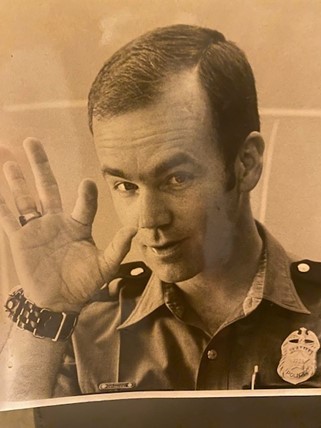

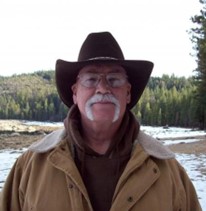
Danny Barrett #2948, retired Seattle police detective, passed away on Thursday May 16, 2024, at 82 years of age.
Danny was born and raised in Glendora, California. He grew up attending Cub Scouts and later Boy Scouts, and developed a passion for fishing at an early age. As Danny got older, he maintained a paper route and raised rabbits to sell. At the age of 17, he enlisted in the Navy and went to boot camp, where he trained as a Naval Boiler Technician. Danny served on the USS Sacramento and spent nine months in Vietnam. After eight years in the military, he returned to Bremerton on the USS Lindy McCormick. Immediately following his naval service, he joined the Army Reserve as a Drill Sergeant.
Danny had a young family and began working at a local dive shop, making diving suits. One day, he saw an advertisement for SPD and decided to apply. SPD called him immediately, inviting him to take a physical test the next day. He showed up in sweatpants and successfully passed the test. Afterward, they asked if he could stay to take his oral boards right then and there. Despite being dressed in sweatpants, he was given a pending job offer. On July 23, 1968, Danny was hired and assigned to Academy Class #57, along with Ty Kane #2977, Pat Powers #2951, Gary Weyers #2939, Ken Jakobsen #2963, Gene Hunt #2592, Ross Carmen #2976, Vern McRae #2978, Ron Kuehner #2952, and Rick Day #2959.
Once out of the academy, Danny spent the next five years in Patrol. Additionally, he was part of the SPD Pistol team and TAC Squad. In 1974, he was assigned as an Academy Instructor teaching defensive tactics. It didn’t take him long to realize that some were lacking in fighting skills; so, he invited anyone who wanted to, to stay after the regular day and get some extra training in. One of those students, from Tukwila PD was a one-man squad on graveyard shift three months later, when a fight broke out at the Riverside Inn. Dean Shirey #5585 made the mistake of trying to break up the fight and ended up putting out a help the officer. Fortunately, Seattle PD showed up and by the time it was over Dean stood in the parking lot wondering where all the cops went! To this day Dean doesn’t know who to thank, but he credits Danny’s training as the only reason he didn’t end up in the hospital or worse that day.
At some point in 1979, Danny was assigned to Accident investigations. During this time Danny signed up for the LEAP Program (Law Enforcement and VA Benefit Monies) and earned his BA in Public Administration through the University of Puget Sound and later his master’s in public administration, classes were held in UPS’s Extension Campus on the second floor of the PSB.
In January 1981, Danny was assigned to the Auto Theft Unit, during which time he attended bomb tech school. On June 3, 1981, he was assigned to the bomb squad. In March 1981, Danny, alongside Sgt. Rod Jackson #1196 and JJ Jankauskas #2729, responded to a bank robbery where a teller had a bomb secured to his leg by a suspect. JJ removed the bomb, wrapped it in several telephone books, and placed it in a bomb basket. The decision was made not to transport the bomb in the trailer to the range, but they would transport it in the van with them, maintaining radio silence. On the way to the range, police radio continuously tried to contact them. Rod told Danny to respond and when Barrett keyed the microphone, it caused the explosion. Instantly, the car was filled with confetti from the telephone books, impairing their sight and hearing. Weeks later, Danny arrested the suspect, who had used the same method to rob other banks. Danny never recovered from his hearing loss.
On July 17, 1984, Danny began working patrol in the South Precinct; he had just retired, after 20 years of service in the Army Reserves. A year later, on June 26, 1985, Danny went to the Juvenile Unit and then transitioned into the newly created Gang Unit. Where he and Dean Shirey #5585 were partnered up. Naturally, they started their day by going to coffee. One morning, while walking up Third Ave to the coffee shop, a man with a gun called came out at the McDonald's at 3rd and Pine. Not one to avoid a little police work Danny was always eager for a hot call. He looked at Dean and said, "Let's go"! They started jogging up the sidewalk, but suddenly, Danny stopped dead in his tracks and Dean almost ran into him. Danny turned and said, "Hey, do you have your gun?" He had left his in his desk drawer! Dean had his, but Danny was a way better shot, having been on the pistol team, so Dean handed his gun to Danny and said, "You lead!". It turned out the man was actually wielding a piece of rebar. With Danny around, there was always reliable backup and a chance for a laugh after a call. Danny retired on January 4, 1994, after 26 years of service and moved to Waterford, California, to be near family.
In 1997, Danny met his future wife, Linda, while playing pool at the VFW. In 1999, they married and lived in Modesto, California. They enjoyed day trips riding their motorcycles, participating in veteran’s rides, attending the annual Laughlin River Run, riding with the Blue Knights, hunting and fishing, and traveling to play in pool leagues.
In 2012, Danny started working again when he heard about a Bass Pro Shop opening nearby; he helped set up the store and worked at the gun counter for about a half year.
A Seahawks fan to the end, Danny got a call from another retired cop in Modesto, telling him that they could work the Raiders games, working security and watching the games. He did this for a couple of years.
In 2017, Danny and Linda moved to Newalla, Oklahoma, to be close to their daughter and grandkids. Danny found joy in his family and friends and simple pleasures throughout his life. He was a proud veteran who cherished his family, friends, and country above all else.
Danny is survived by his wife of 30 years, Linda. His children, Jeremy, Shannon, Carrie and Kim; Eleven grandchildren and eight great grandchildren.
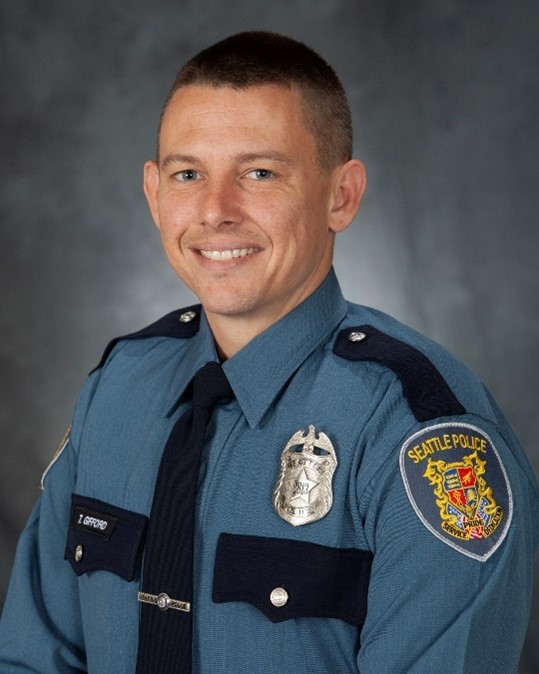
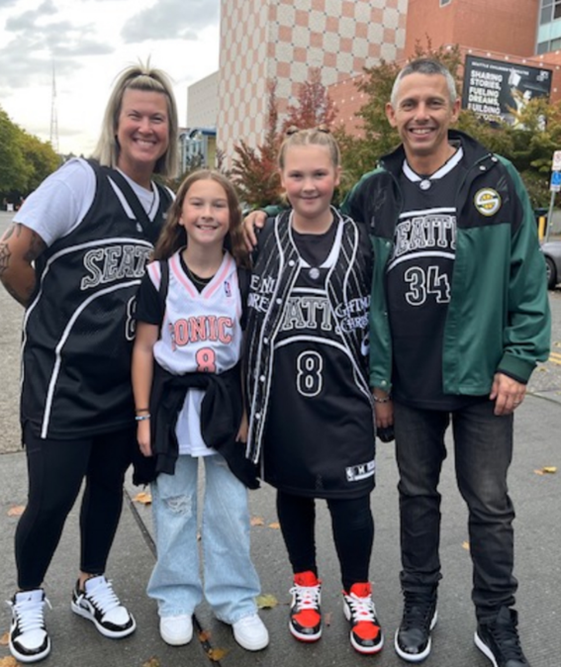

Timothy Gifford, #7613, Seattle Police Detective, passed away on Sunday, May 12, at forty-three years of age.
Tim was born and raised in Renton. He loved to learn, but he also enjoyed playing soccer, baseball, and sports in general.
Tim graduated from Renton High School in 1999. He had been awarded a soccer scholarship but, unfortunately, was not able to accept it due to a health issue at the time. Tim spent a year at WSU and decided to transfer to UW.
In 2002, Tim ran into Megan, who he had known prior, and they started dating. In March 2003, they married. Tim graduated with a BA in Psychology from the UW in 2004 and immediately went to work for Columbia Distributing. Later, he added Hertz as an employer.
Tim was an avid fan of the Sonics and enjoyed basketball so much that he was a season ticket holder. However, the Seahawks never won him over; he remained a true Patriots fan.
In 2011, Tim and Megan attended Folk Life. While sitting on the grass, they conversed with a group of officers. Tim shared that he had always wanted to be a cop and that if all cops were like the ones they just spoke with, he absolutely wanted to be one, to give back to the community and make a difference. Tim set his goal and passed the written but did not do well on the oral boards. Tim persevered and retook the test; when he passed his oral board, he was told that the city was on a hiring freeze. Tim was hired on February 12, 2012, and entered into Academy Class #681 along with Brett Willet #7615, Ryan Ellis #7612, Troy Johnson #7614, Brad DeVore #7611, Shawn Crow #7610, and Todd Nelson #7358.
Tim's first assignment was to the 1st watch East Pct, George Sector and later transferred to 1st Watch Relief. On September 17, 2015, Tim was assigned to the South Precinct, working 1st Watch Relief Squad and would eventually be partnered up with Mike Nicholls #7668 in a two-person car.
On November 15, 2017, Tim went to the Navigation team. There, he worked alongside Wes Phillips #8306, Mike Nicholls, and his academy mate Brad Devore #7911. On September 18, 2019, Tim transferred to the Harbor Patrol, where he worked with Darren Long #6641 and Ed Yamamoto #5088. Tim loved being on the water. As a harbor rookie, Tim was at the helm on Lake Washington with Ed while patrolling Andrews Bay. One of the priorities included ensuring vessels were anchored in the designated area. Tim quickly maneuvered through the bay, going between the openings of the anchored vessels. This location typically has southeast winds, but at that moment, the winds were coming from the North ever so gently. From a land standpoint, it was not significant, but from a boat and water standpoint, it was.
Tim began to approach the group of vessels from the North to the South so that we could give them a verbal warning. As Tim made his approach, the boat was starting to drift to the South, so Ed informed Tim to engage the Port engine (left side) to move forward and stay clear of the anchor lines of the vessels that they were on their right side. Well, as it was, Tim engaged the starboard engine forward. With the combination of the boat's forward momentum and the wind, the stern of the boat went right, literally, right into one of the anchor lines. They were anchored in the bay with the other boat's anchor line wrapped up in their props. Tim had that "Oh S… moment, what do I do now?". Somehow, the irony of being anchored outside the designated anchorage area on someone else's anchor was a bit funny…at least to Ed. Tim didn't laugh at the moment, but it was a lesson learned, and Ed began gearing up to dive to clear the prop. The task in itself did not take long, and they even had the support of other boaters who had been contacted earlier. They recovered the line and anchor off the boat, located the vessel owner, and returned it to them. They all laughed…and Tim did too. Tim and Ed came away with a funny Harbor moment and the start of a friendship.
It was time for a change and a more regular schedule. Tim transferred to Background Investigations on May 10, 2023. Once again, working alongside Wes Phillips. Tim really enjoyed this position. It allowed for a regular routine with his family, and he enjoyed working and being a part of the hiring process.
When Tim was off duty, he spent time with "his girls". In 2023, the decision to home-school his two girls was made. Tim is credited with setting out, creating lesson plans, and setting up all the computer reporting systems and the curriculum. Family was his top priority, and Tim made it a point to live his life to the fullest. He was always up for an adventure, either attending local sporting events, Mariner's games, working out, or simply being outdoors. He swam with Turtles and scuba dove amongst the Sharks on the Northshore of Hawaii. But family trips to Disneyland were always at the top of the vacation list.
Tim never spoke negatively about his life or complained; even during his long and difficult health struggle, he always remained positive. On May 12, 2024, Tim passed away. As a tribute to Tim’s love of Jordan’s, many wore them in attendance at his funeral.
Tim is survived by his wife of 21 years, Megan; their two daughters, Olivia and Sophia, and his dad, Greg Gifford.
Written by: Stephanie Coleman
Seattle Police Pension
Stephanie.Coleman@seattle.gov

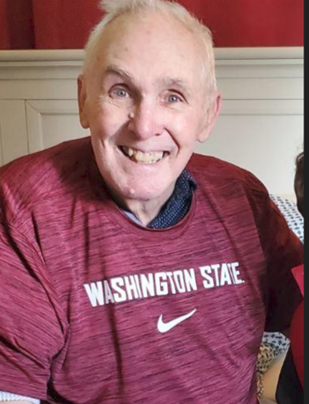
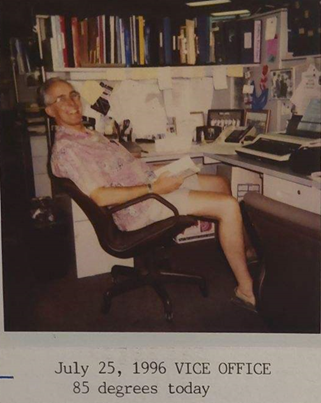
Michael Burke #3140, retired Seattle Police Detective, passed away May 7, 2024 at the age of seventy-nine.
Mike grew up in Pasco, Washington, where he developed a passion for sports, especially basketball. He loved running the 880-yard dash and even learned to dunk on a cement court. During summers, he worked as a fireman for Northern Pacific Railroad. After graduating in 1963, Mike enrolled at Washington State University, preparing for the possibility of being drafted into the military he signed up for the Navy attending boot camp in San Diego. He was then assigned to Chichi Jima, where he guarded the Copper Caves. Enjoying 18 months of service without being in a war zone, he happily completed his active duty and moved on to the next chapter of his life.
Upon returning to Pasco, Mike worked as a brakeman for the North Pacific Railroad. After a close call with frostbite during a winter shift, he quit and transferred to Columbia Basin Community College for basketball. Moving to Seattle to be near his brother, he worked unloading boxcars.
While visiting his grandmother, he saw a billboard with Martin Milner (1Adam12) advertising SPD on his way to the SPD test, he met fellow candidate Dan Oliver #3127. Mike was hired on May 6, 1969, entering Academy Class #60 Classmates included: Tom Grabicki #3156, Lou Marks #3161, Dick Gagnon #3145, Andy Depola #3125, John Kristof #3122, Dave Malland #2553, Terry Shipp #3153, Dan Woelke #3072, Carl O’Leary #3151, Fred Still #3104, Jim Kegley #3175, Jim Sleeth #3132, Jim Yoshida #3168, and Don Meyers #2566. The academy was held downtown for two weeks, and the rest was upstairs at the South Precinct (Georgetown). The students had been activated from the academy to work the UW riots.
Tom Miller #3023 was Mike’s FTO, but Mike actually had more time on the streets than Tom did. Mike began his journey at the downtown headquarters, where he met Charlie Ray #1687. Inspections for hair length, uniforms and weapons were very common. He worked as car 212 in Shilshole and Golden Gardens. He had the chance to walk beats with experienced officers on First Avenue and Pike Street. In early 1970, he and his partner Dick Gagnon #3145 were assigned to guard the Japanese embassy after some worrying threats from a group called the Red Brigade. His first solo patrol car was 214, covering Greenlake to Phinney Ridge. Although he didn’t always work with the same partners, he often teamed up with John Nordlund #2909 and Ed Joiner #3214. At the 1971 retired officers’ banquet, Mike received a fun recognition for having the highest serial number in the house!
Basketball was a huge passion of Mike's, and he loved working with the Referee Association, officiating Junior High and High School games from 1972 into the early '80s. In April 1974, Mike's life changed when he met his future wife, Dawn at Pilgrims Pantry in the U District. By September 1974 Mike had earned his AA in criminal justice from Shoreline Community College.
By around 1976, Mike was ready to embrace new adventures, and he jumped into the traffic enforcement unit, specifically the DWI squad. After spending two exciting years there, he made the switch to Motorcycles on October 14, 1980, earning the fun nickname “Mr. Sports.” During this time, he also joined the Motorcycle Drill Team, partnering up with Glenn Scott #2918. Mike loved being part of parades, Seafair festivities, and the annual trips to Camp Casey. Mike is said to have written over 17,000 tickets during this time.
Mike had a knack for bringing people together; he organized basketball games with his academy friends, hosted lively poker nights, and even started what he proudly called the “World Series of Poker.” He kept in touch with many of his classmates, often enjoying golf, poker, and fun train rides or RV trips to cheer on Husky football in Oregon. By 1983, he played on the “Wombats” team, with members like Captain Dick Niemiec #2991, Steve Anderson #2818, and many others, to achieve a five and three record at the PSB.
On October 11, 1989, Mike was recruited by Dan Woelke #3072 to join the Vice unit. He enjoyed working under John Mason #2884, and later Dan Oliver #3127, whom he’s remained connected with since they first met while preparing for the SPD Test. While in Vice, Mike also investigated Child Exploitation cases.
In 1997, Mike transferred into the Sex Offender Detail, working under his academy classmate, Captain Tom Grabicki #3156. Mike worked in a one-person corner office along with Randy Moore #4786, Bob Shilling #4384, and Stephanie Coleman #5583 on the 5th floor of the Arctic Building. Mike verified RSO's living in the East and North Precinct areas. Less than a year later, Chris Wrede #4294 replaced Randy. Mike had an undeniable ability to engage those around him, often seen perched on a desk with one leg dangling off, wielding an 18" ruler as his "talking stick," bringing humor and life to every story he shared.
On November 7, 2001, Mike was assigned as the Acting Sergeant in patrol at the South Precinct. He later was assigned to Radio. On June 11th, 2003, after 34 years in service, Mike retired.
Mike’s passion for trains, led him to work for Amtrak as a security officer. After that, he spent about a year teaching at a driving school. In 2006, he volunteered with the National Center for Missing & Exploited Children (NCMEC). By January 2013, Chris Wrede #4294 encouraged Mike to join him again as a contractor for background investigations, and Mike signed a three-year contract for that position. It was during these years where he would visit the Pension Office and through many conversations it was discovered that Mike and Jan Brandes are cousins, reminding us all, it’s a small world!
Mike was an incredibly active volunteer, brightening the Edmonds community with his generosity. He spent two days a week at the Edmonds Chamber of Commerce visitor’s center, he dedicated his time to the Edmonds Museum, and enjoyed volunteering at his grandchildren's school, where the 5-year-olds endearingly called him "Grandpa Mike." He’d chuckle about becoming a shoe-tying expert! He loved volunteering at the car show and the Taste of Edmonds. You could find him taking walks with his dog and chatting with local business owners. He often met up with buddies for coffee at LaVern's or the Walnut Café and enjoyed visiting U Brew.
He treasured the time spent with friends like Sean O'Donnell #4621, Joe Higgins #3981, and Scott Waltier #6166 at Channel Marker, sharing laughs and stories.
Mike and Dawn enjoyed many adventures together. They traveled a lot, making wonderful memories in Washington DC and NYC,visiting Paris and Normandy in Europe, and exploring England, Scotland, and Ireland. They were amazed by the beauty of New Zealand while staying with Larry Stewart #2420 in Kirikiri and took a cruise through the Panama Canal. Alaska and their stays at their Maui condo were special to them, and they loved spending a month by the beach in Teacapan, Mexico, before going to Arizona for Mike's Chi Chi Jima reunion.
It's important to recognize Mike's significant impact on composing this Last Ring. Over many years, Mike reached out through emails, calls, and texts, giving several of us a glimpse into his life. Many of us will always cherish Mike's willingness to share his own life stories. In memory of Mike, I will end this writing as he always did. Mike "It's an Edmonds Kind of Day" Burke in Edmonds.
Mike is survived by his wife of 46 years Dawn; his daughter Alison; three grandchildren; and many nephews. Mike is predeceased by his son, Adam.
Written by: Stephanie Coleman
Stephanie.coleman@seattle.gov
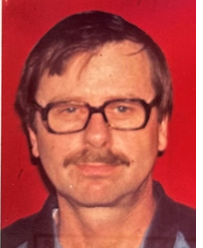
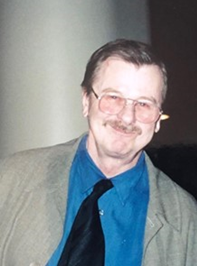
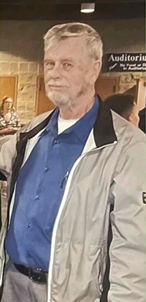
Victor Ensz #2537, retired Seattle police patrol officer, passed away on Sunday, May 5th at eighty-five years of age.
Victor was born and raised in the University District. Vic was an avid learner from a very young age. He attended Roosevelt High School until he decided he wanted to graduate from the same high school that his mom graduated from so he transferred himself to Lincoln High.
In his junior year, Vic enrolled in the Navy Reserves. Despite being offered numerous scholarships to the University of Washington, Vic chose to enter the Navy after graduating in 1956. During his service, he became a skilled pilot and worked in submarine warfare.
During a high-stakes special interest flight, Vic guided the aircraft over international waters in pursuit of submarines. In a dramatic turn, Vic intercepted and recorded crucial radio transmissions, capturing the Russian military discussing inert bombs deployed for "tests." Upon returning to base, Vic delivered invaluable recordings, enabling the US to unravel the advanced technology wielded by the Russians.
After serving two years of active duty, Vic remained in the Navy Reserves for several years. Vic then pursued higher education, earning a Bachelor of Arts degree from the University of Washington in Aeronautical Engineering.
Vic’s commitment to public service led him to apply to both the Seattle Fire and Police Departments. Fire called first, so Vic and his cousin Dave were hired the same day and entered drill school. However, the fire department decided not to hire Vic at the end of the school because he had an opinion on everything. So, when SPD called, Vic signed on immediately. He was hired on January 31, 1966, and entered Class #50 alongside Lee Deshaw #2532, Frank Butcher #2529, Rudy Sutlovich #2544, Jerry Taylor #2533, Doug Fritschy #2033, Mike O’Mahony #2530, Jerry Beem #2542 and Ken Davis #2547, to name a few.
Vic worked Patrol his entire career and was instrumental in recruiting both his good friends Dave #2381 and Mike Severance #2866 to the department. Vic was surprised to find his friend from the military, Jim Kegley #3175 had an adjoining locker next to him at the precinct.In 1980, Vic was assigned to First Watch at the Georgetown Precinct. Around 1981, Vic transferred to the Second Watch Robert Sector, working the shift from 12 pm to 8 pm, so squad parties were common. Rick Heintz #4219, Mike Nolan #4903, Bruce Wind #3995, Bob Robbin #4351, Bob Lisoski #2817, Kevin Aratani #4193, Larry Sutton #2586, Jim Kegley #3175, and Ron Mochizuki #4281, frequented Happy's Tavern next door to the precinct. Later, this group became members of the Eagles and formed the "Debauchee's Anonymous" group, hosting big department-wide parties there. Vic was a "founding member" and the one who came up with the group's name.
In October 1984, Vic was driving his car when another car came down the wrong way on the freeway and hit him head-on. Vic was not expected to survive. However, despite having multiple fractures and a relocated pelvis, Vic persevered. Within months, he was back to jogging on Alki Beach, where he lived.
After 19 years of service Vic retired from the department on April 3, 1985.
Vic enjoyed various hobbies, including swimming in Puget Sound while wearing a wet suit. He was very passionate about martial arts and held a 9th-degree red belt. Vic was dedicated to learning and had a deep understanding of Taekwondo and Jiu jitsu. He also spent a lot of time studying philosophy and reading a books. Vic once traveled to India to study with monks for 30 days in silence.
In 1998, Vic went to work for the King County Superior Court as a Court Marshal. In the year 2000, Vic made a life-changing decision. He sold his home on Alki and relocated to Arlington, seeking solace in the companionship of his loyal dog, Harley.
Vic's thirst for knowledge knew no bounds. He delved into the study of every religion and assumed the role of a senior elder at the University Lutheran Church. Victor's unwavering faith and profound philosophical perspective were the cornerstones of his existence. Material wealth held no sway over him; it simply did not matter. Vic's legacy endures through the lives he influenced and the indelible memories he crafted.
Victor is survived by his niece and three nephews.
Written by: Stephanie ColemanSeattle Police Pension Office
Stephanie.coleman@seattle.gov
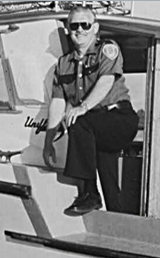
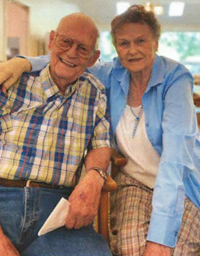
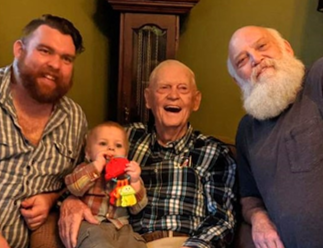
Don Wood #1723, retired Seattle Police officer, passed away on Thursday, March 21, 2024, at 91 years of age.
Don was born and raised in Battle Creek, Michigan. He came to the Seattle area after his parents divorced and lived with his dad in White Center. As a teenager, Don worked quite a bit as a busboy and various jobs. In High school, Don met his future wife, Barbara Jean. After graduating from West Seattle High School, Don married and joined the National Guard where he served for two years.
Don briefly worked for the US Post Office. The Seattle PD was actively recruiting with radio announcements, billboards, and posters being widespread. Don might have even noticed a recruitment poster at the post office and decided that becoming a policeman would offer his family more stability.
Don was hired on October 8, 1956. He graduated from Academy class #36 along with Howard Slessman #1672, George Berger #1734, George Pearson #1728, Al Carmony #1738, and Al Fridell #1744, to name a few.
After graduating from the academy, Don worked patrol until March 5, 1958, when he was assigned to the Motorcycle Unit working for Sgt. Al Elliott #754. Some other squad mates included Clay Hill #1735, Frank Jones #1885, Merle Dickhaut #1647, Bob Llewellyn #1697, Dean Murphy #2068, Gordie Sackett #1433, Russ Stallman #1899, Bill Rauschmeier #1461 and Bob Ottersen #1894.
Don enjoyed being part of the motorcycle unit in the early 1960s. During that time, there was a significant issue with street racing in West Seattle. To address this problem, a pilot project called the "Good Driving Citations" program was introduced. Don's role involved pulling over students who were driving responsibly and rewarding them with a $25 savings bond and a "Good Driver Citation." This initiative was successful in reducing street racing for some time.
On September 14, 1964, Don was assigned to the Jail Unit in the Public Safety Building. Don was promoted to Investigator on May 2, 1966, and worked on the "Special Detail”, now called Traffic Investigations. This unit investigated all major traffic accidents Don worked alongside Jake Ehli #1881 and Ray Gonstead #2172, and for his previous Sergeant, Al Elliott. Cadet Ken Baggen #2523, also worked in this unit and was the “victim” in many pranks, including upside down drawers filled with three-hole punch circles.
On January 1, 1970, Don was promoted to Detective and continued to investigate vehicle accidents and worked under (now) Lieutenant Al Elliott.
Don was assigned to the Harbor Patrol Unit on October 4, 1972. He loved working the boats and being on the water. Don was known to make his famous spaghetti with Louisianna hot links for everyone working at these large-scale events. He worked at Harbor for about nine years before officially retiring on October 31, 1981, after 25 years of service.
When Don retired from SPD, he immediately went to work at the US Federal Court House as a Marshall. In April 1995, the Murrow building was bombed in Oklahoma City. On June 12, 1995, a small explosion device went off by the front door of the courthouse; the device was a pop or beer can was filled with black powder. Don was the first at the scene, and fortunately, there were no injuries.
In 1996, after working for the Federal Courthouse Marshall's Office for 15 years, Don decided it was time to retire officially.
Don and Barbara Jean embarked on a journey in retirement that took them to live in various locations from Everett to Honolulu and California, before finally finding their way back to Wenatchee. It was here that they had created cherished family memories throughout years of camping adventures.
In his leisure time, Don found solace in woodworking, meticulously crafting a fleet of remote-control boats in different sizes, each boasting interchangeable engines. Alongside his woodworking passion, Don also dedicated himself to daily walks, covering an impressive four to five miles every day. By 2020, Don and Barbara made the decision to relocate closer to their son in Skagit County.
Don is survived by his wife of 73 years, Barbara Jean, two sons, Randall and Ricky, three grandchildren, and ten great-grandchildren. His daughter, Teresa, predeceased him in 2008.
Written by: Stephanie Coleman
Seattle Police Pension Office
Stephanie.coleman@seattle.gov
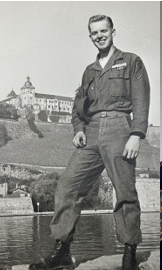
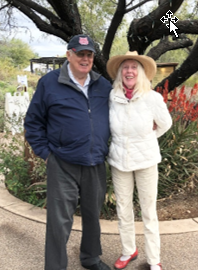
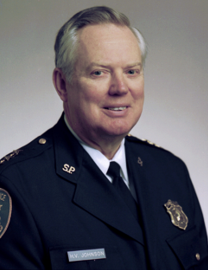
Herb Johnson #2414, retired Seattle Police Interim Chief of Police and former Assistant Chief, passed away on Saturday, March 16, 2024, at 88 years of age.
Herb grew up in Ballard with his three siblings. His dad sold fishing supplies and even guided for John Wayne. When he was 12, Herb landed a job at the Bay Theater, where he could watch all the movies he wanted while picking up trash between shows. In high school, he worked at a photography studio, developing film, and that's where his love for photography began.
After high school, Herb joined the Navy ROTC. He joined the Army after the Navy tested him for a specific class and later reneged. Once in the Army, Herb was assigned to the 1st Infantry. Knowing the Army did the opposite of what you asked for, Herb said he preferred to go to Korea. Herb was assigned to a base in Germany as the camp photographer and chauffeur to the General. This allowed Herb to travel throughout Europe, and this is when he fell in love with Paris.
During his time in the Army, Herb was part of the Army Color Guard and appeared on the episode of the Ed Sullivan Show the same night as Carole Burnett's first appearance. After three years of service, he was discharged and returned home to enroll at the University of Washington, where he studied and received his degrees in literature and psychology. Despite not speaking French, he pursued his passion for literature and returned to France having enrolled at the Sorbonne. Herb attended French-speaking classes in the morning to learn French and attended classes at the University in the afternoons, which were all conducted in French.
Herb was recruited by the CIA. While at the cafeteria one day, he was introduced to Joyce, another CIA employee, through mutual friends. They went on their first date on John F. Kennedy's inauguration day, in the snow, and later married in 1961. After a few years, they moved back to Seattle, and Herb started teaching high school French at Ballard High School. Herb gained a reputation as a strict teacher. Once, a student misbehaved in class, and Herb asked him to step into the hall. While there, Herb warned the student to "shape up." The student stepped back, hitting the door, and the other students thought Herb had hit him, which he hadn't. However, Herb chose not to correct the misunderstanding. Herb had no discipline issues in the classroom. Some of Herb's students included Steve Thomas #3084, Jerry Bickford #3693, Mike Crist #3389, Fred Hill #3299, Ray Holm #3702, Fred Still #3104, Ken Baggen #2523, and Steve Stokke #3209.
Herb always had an interest in policing and decided to become a Police Reserve. He soon discovered that he enjoyed policing more than teaching and decided to pursue it full-time. On July 1, 1964, Herb was hired by the SPD. In September 1964, he entered Academy class #48 alongside Paul Eblin #2550, Nick Bulpin #2185, Chuck Pillon #2408, Richard Ramon #1908, Bob Lapthorne #2407, Jerry Teller #2434, and Al Wilding #1574, to name a few.
Work assignments were maintained by SPD, not our office, therefore we mention assignments only as we’re able to confirm them. Clark Elster #2025 was Herb’s first field training officer and thus started a lifelong friendship. Clark and Herb would frequently work together throughout their careers.
Later, Herb was partnered with Neil Moloney #1527 and worked many off-duty jobs, events, concert security. Herb was promoted to Detective on July 1, 1968, and put in charge of the Women’s Bureau. Around this time, Herb bought a "hobby farm" in Poulsbo to bring his family closer to his wife's. The farm had horses, 15-20 cows, chickens, and a 20-acre garden, as well as orchards with apples, plums, and cherries.
On November 27, 1972, Herb was promoted to Detective Sergeant. Sometime during this timeline, Herb was assigned to the Intel Unit, but it is unclear as to the length of this assignment. On November 4, 1974, Herb was promoted to Sergeant; and later to Lieutenant on June 21, 1978. On August 29, 1979, Herb was assigned as the Administrative Aid to Chief Fitzsimmons.
Herb was known for his incredibly neat and meticulous handwriting, almost a size six font. When irritated, his writing became even smaller, much to the amusement of Chief Fitzsimmons, who would often jokingly comment, "Herb, I know you're upset with me, but I really need you to write larger!" Despite his precision and professionalism, Herb had a great sense of humor. One evening, Herb and his wife attended the opera. As they waited to cross the street, someone made a lighthearted comment about a police officer showing up if they crossed on a "don't walk" signal. In response, Herb casually opened his overcoat and revealed his badge, eliciting a big laugh from everyone around.
On April 7, 1981, Herb was promoted to Captain, this prompted his move to Ballard as his four hours commute a day was unacceptable for a duty captain, which was required of every Captain for a week, around every ten weeks. Herb was promoted to Major on January 1, 1982, and oversaw Inspections and Planning. Additionally, he oversaw the implementation of the new “Special Patrol Unit” which was created in 1985, formerly the TAC Squad or SWAT/ERT as it would later be called.
Herb was appointed Assistant Chief on December 23, 1988, replacing Noreen Skagen #1990, when she was appointed to the US Marshall for Western Washington, he was assigned for a while to Inspections and Planning and then later the Patrol Division. And lastly, he would take over the Investigations Bureau. After 30 years of service Herb retired on December 31, 1993, having overseen every bureau within the department.
In November 1999, Seattle hosted the WTO Conference. The "Battle in Seattle" ultimately led to the resignation of Chief Stamper. After seven years of retirement, Mayor Schell appointed Herb as the Interim Chief of Police on February 17, 2000, to improve the morale and image of the Department.
After three weeks back on the job Herb, was awakened by Captain Dan Oliver #3127, who informed him that the Mardi Gras celebrations were becoming unruly. Herb grabbed a riot shield and flashlight and headed to Pioneer Square. Newspaper reports that many officers were surprised to see the 64-year-old Johnson in a red V-neck sweater, slacks, and dress shoes. Despite his unexpected appearance, Herb was there to assist and ensure the officers knew he was right alongside of them. Just after 3AM, Herb was on his way to Harborview, having just been notified that Tom Mooney #5826 had been injured. He continued his day in the office, just as if he had a full night’s sleep.
On April 10, 2000, a news report states that Herb was heading home after work when a disturbance call came at Golden Gardens came out over the radio. One suspect had a knife. Herb said, “I figured there are only two ways out and I just decided I was going to get there as quickly as I could and see if they were still there.” Herb arrived within minutes, spotting the vehicle, he followed the car, advising dispatch; Herb and a Patrol Officer, pulled the vehicle over and arrested both suspects. When asked about this Herb replied, “It felt good; that’s why I like police work; there’s the excitement of the job on the street.”
By late May, hundreds of Seattle Police Department employees, sworn and civilian, signed a petition urging Chief Johnson to stay. Though, Chief Johnson, was humble and very grateful for the confidence in his leadership, he once again retired on August 14, 2000.
After retiring, Herb found joy in sailing with Clark Elster #2025, Harry Schneider #1430, and Al Fridell #1744 between Seattle and Bainbridge Island. Throughout their retirement, Herb and Joyce relished their trips to Paris and Iceland; reconnecting with friends and indulging in their shared love for square dancing. Herb's unwavering honesty was evident when, during scheduling of the SPRA condo in Sunriver, the people exceeded the condo's occupancy limit of six by one, so Herb said they could not vacation there that year. Despite his love for following rules, Herb's integrity shone through in every situation. Herb was an avid reader, delving into a wide range of genres including current events, biographies, spy novels, and the works of Louis Lamour. His circle of friendships remained strong, and he looked forward to the regular Saturday brunch gatherings with the "crunch bunch," which included Al Fridell, Bill Wall, Clark Elster, and Roy Skagen. Herb's retirement was filled with meaningful experiences and cherished connections.
In 2002, Assistant Chief Roy Skagen #2204 nominated Herb for induction into the Ballard High School Foundation’s Wall of Recognition. This prestigious recognition was a testament to Herb's outstanding public service achievements. Herb's nomination was met with great enthusiasm and support from his peers, who recognized his exceptional accomplishments.
Herb continued to serve law enforcement by being appointed to the Public Safety Civil Service Commission. Herb was appointed and served two terms on this board, from May 10, 2004, until December 31, 2009.
On November 30, 2020, after almost 60 years of marriage, Joyce passed away.
Herb was a man of great integrity and highly respected within law enforcement. He had no political agenda and was a trusted figure amongst law enforcement, his peers and the public. Herb’s commitment to fairness was unwavering, even when he encountered disagreement. Leading by example, he never hesitated to roll up his sleeves and tackle a challenge alongside his team, never expecting them to take on a task he wouldn’t undertake himself.
Herb is survived by his daughters Jennifer and Amy and his two granddaughters Quinn and Avery.
Written by: Stephanie Coleman
Seattle Police Pension Office
Stephanie.coleman@seattle.gov
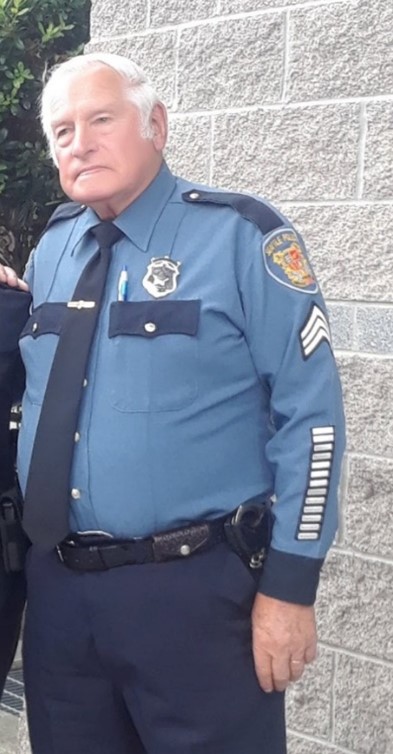
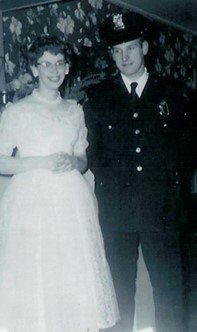
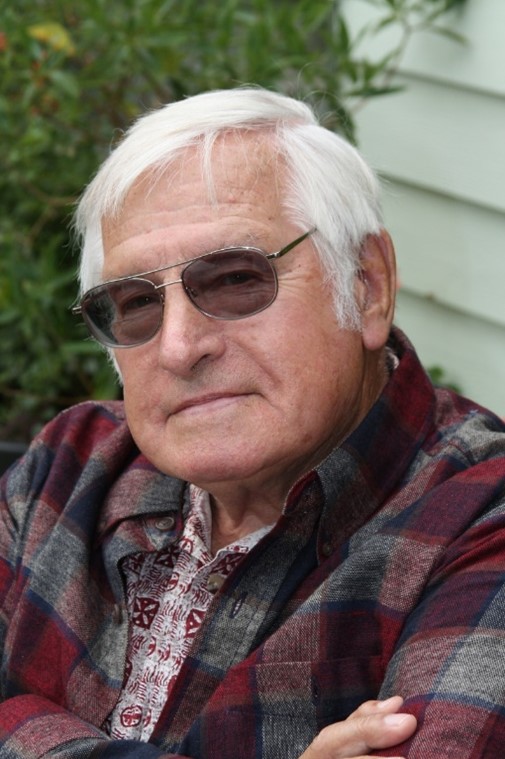
Joseph “Joe” Sanford #1896, retired Seattle Police homicide detective sergeant, passed away on March 12, 2024, at 88 years of age.
Joe was born and raised on a farm with 11 siblings in Brim Creek, Washington. He knew early in life that he wanted to be a police officer. By the time he was eleven years old, he was the garbage man for the entire city. After graduating from Winlock High School in 1953, Joe married his longtime girlfriend, Faye. Joe then worked as a truck driver for the Weyerhaeuser Timber Company.
Initially, Joe tested to become a trooper; luckily for Seattle, Joe was a ¼” short of their requirements. After testing with Seattle, Joe was heading out the door to get his academy uniform, and a sergeant stopped and asked about his age. Joe replied he was 22 years old. This was a time when you had to be 23 years old. The waiting game began but true to the Sergeant's word, Joe got a letter to report to the academy just after his 23rd birthday.
On January 2, 1959, Joe entered academy class #39 along with Frank Jones #1885, Joe Tolliver #1901, Tom Caldwell #1845, Bob Trebon #1902, Ernie Bisson #1872, Charles Scheuffele #1864, Joe Cordas #1878, Lynn Coney #1858, Beryl Thompson #1833 and Donna Brazel #1618.
Joe was assigned to the Wallingford Precinct along with Jack Seil #1898, as the Ballard car rotating between Second and Third Watch’s every 90 days. By 1963, Joe’s partner was Jerry Adams #2010, and they worked as car 211 in Ballard. On June 30, 1965, Joe was promoted to “Investigator”, it is not clear where he was assigned. In 1966, Joe’s brother, Noel Sanford #2524, was hired by the department. Joe was rising through the ranks and was promoted to Detective on October 18, 1967. A short two years later, on January 1, 1969, Joe was promoted to Sergeant and assigned to the Organized Crime Unit/Intelligence Unit. By the Mid 1970’s Joe and Jerry Adams #2010 were back together, this time in the Narcotics Unit.
Joe had a knack for being in the right place at the right time. During a narcotics raid, the suspect pointed a handgun at Joe and Jerry from a second-story deck. Jerry shot the suspect, but the suspects gun was nowhere to be found. After searching for a long while, the gun was discovered when Joe got up on the back deck and saw a car headlight glint off a shining object about 100 yards down the road.
Joe’s investigative technique was described as an “old-time street cop”; if there was anything to follow up on, there was no waiting until tomorrow. Joe would immediately start tracing leads and tracking people down. If Joe said, “I need to go mish-mashing around,” you knew he was hot on a trail, and the case would soon be solved!
On January 1, 1970, Joe was promoted to Detective Sergeant and was recruited to Robbery by Sgt. Elmer Wittman #1145.
It was sometime around this time that Joe was endearingly referred to as “Papa Joe” or “Uncle Joe”. He was a gifted teacher, mentor and led by example. When a new member came to the squad or when assigned to a new unit, Joe always started off by sitting everyone down and saying, "let's get this straight, you don't work for me, I work for you. You all know your jobs and what to do. I just want you to let me know what I can do to make your job easier"
Joe had a remarkable talent for connecting with people. He used to say, “There's no real trick to talking to people. You can't treat someone poorly and expect them to confide in you. Treat them with respect, even if they don't deserve it, and they will be more open with you.” With suspects, the term “being Sanforized” was frequently mentioned. This involved Joe sitting down and saying, “We already know what happened, so you might as well tell us your side,” which often led suspects to start confessing.
Joe was very active outside of work with his family, coaching or going to his kids’ sporting events and Joe still maintained and worked the family Christmas tree farm. For many years, Joe would cut down five to six trees and bring them to the SPAA Pavilion for the GRAM Christmas party. Many would be fortunate enough to re-home the trees after the party for their own Christmas.
In 1978, Joe's son Bill bought a house with his wife. The neighbor had a lot of garbage around the house, which caused a rat problem. Bill asked the neighbor if he could clean it up. The neighbor replied, “go ahead”. Bill cleaned up what he could and unfortunately, the neighbor's dog got into the rat poison and died. In retaliation, the neighbor killed all of Joe's son's chickens. Upset, Bill called Joe for advice. Joe told Bill, "We'll go talk to him together." Joe and Bill knocked on the neighbor's door, and when it opened, Joe’s face turned white and he said, "Oh, I'm sorry, I have the wrong address." Knowing not to question anything, Bill said nothing as Joe turned him toward the staircase, and the door shut behind them. Joe then said, "Get your wife and get in your house and stay there until I tell you to come out." It turns out the neighbor was a wanted homicide suspect.
On February 1, 1984, a third member of the Sanford family joined the department, Mike #4774 and would later become an Assistant Chief.
While working in the Homicide division, three cases stood out for Joe. The first was the 1982 murder of 13-year-old Kristen Sumstad, which remained unsolved when Joe retired. For years, Joe wondered, "What did we miss?" The case was eventually solved through DNA evidence 20 years later. The second case was the 1983 Wah Mee Massacre, in which 13 people were bound and shot execution-style in a gambling club. Joe participated in the international manhunt and helped bring the last suspect back to Seattle. Lastly, there was the Christmas Eve 1985 Goldmark homicides, where a family of four, including a prominent Seattle attorney and his wife, along with their two young sons, were murdered by an intruder in a case of mistaken identity. Even years later, Joe could still vividly recall "smelling the turkey cooking" when he thought about that case.
After 32 years of service (and not a single day of sick time in his career) Joe retired on January 23, 1991, from SPD. Joe was personally selected to create and start the new Seattle Municipal Court Marshall’s Office, with Joe as Marshall #1. Joe recruited many including Rudy Sutlovich #2544, Jerry Trettevik #2155, and John Richardson #2180 to mention a few.
After seven years in the Marshall’s office, Joe retired from the City on January 21, 1998, but he was not ready to give up investigating. Joe was hired by a local private investigation company to take a second look into a case involving some activities by a Japanese high-ranking state priest. Some witnesses needed to be reached again. One particular witness was extremely difficult to locate. The attorney on the case informed Joe that if “you could find this individual and secure a written statement, I’m buying you that new truck you’ve been looking at”. Joe knew he was just kidding but Joe not only located the missing witness, and obtained a written statement that helped close the case! The attorney, true to his word, bought Joe the truck!
Joe loved people and fellowship. He was a founding member of the CORPSE group that meets in Port Townsend as well as our local RAP (Retired/Active Police) group. Joe often told his wife that RAP “kept me going” through the difficult health issues he had. Joe greatly valued friendships and fellowship. He stated about all of the people he worked with that "There are no other positions in life that you share these types of life experiences with, and those are the ties that bind you." Part of fellowship for Joe was honoring those we lost. You could always find Joe at a funeral or celebration of life within a few hundred miles. He even borrowed his son’s car to drive from Chelan to attend a service he had just found out about that was occurring later that day.
As a Master Mason, Joe spent over 25 years actively involved in his lodge in Poulsbo, Including managing the lodge’s investment account. Joe attained the 32nd degree mason status and then advanced to the Shriner’s and was active in the Shurtah at the Nile.
Mayor Bruce Harrell met Joe while competing in high school sports and on the UW Huskies Football Team. He had known Joe for years prior to working at the city. After learning of Joe's passing, Mayor Harrell initiated a proclamation declaring April 6th as Joe Sanford Day. The mayor attended Joe's service to read the proclamation, highlighting the substantial impact Joe had on countless individuals throughout his life.
Joe is survived by his wife of 71 years, Faye. His sons Joe Jr., Bill and Mike; 16 grandchildren, 18 great grandchildren, and two great-great grandchildren. Joe was predeceased by his daughter Kathy.
Written by: Stephanie Coleman
Stephanie.coleman@seattle.gov
Police Pension Office
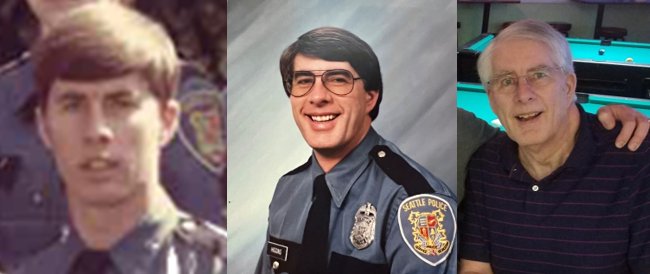
Joseph Higgins Jr. #3981, retired Seattle Police patrol officer, passed away on March 9, 2024, at 72 years of age.
Joe was the eighth child born in Washington State in 1952. He was raised in West Seattle and graduated with his longtime friends Bill #3995 and John #3522 Moffet, and Dale Johnson #3983.
Joe grew up in West Seattle and graduated from Chief Sealth High School in 1970. He was interested in joining the Seattle Police Department early in life and attended the law enforcement program at Shoreline Community College. However, SPD wasn’t hiring due to a city-wide hiring freeze, so he joined the Army and became a military policeman. After basic training at Fort Lewis, he was stationed at Patton Barracks in Heidelberg, West Germany, where he was attached to General Westmoreland’s Honor Guard. Joe served as an MP in the 529th military police and was part of the 7th Army Honor Guard. When Joe returned to Seattle, he joined the Army Reserves, he worked at Harms Detective Agency as a P.I. He then was hired as a police officer with the Port of Seattle. During this same time, Joe earned his degree in Police Science.
On November 19, 1975, Joe was hired as an SPD Recruit. Joe was hired as a patrol officer on April 30, 1976, when the three-year hiring freeze for the city ended and entered Academy Class #79 alongside Karoly Fogassy #4008, Gary Reynolds #3992, Rolf Towne #3955, Fred Ibuki #3982, Andy Bottin #3999, Bruce Wind #3995, Mike Walker #3987, Eddie Rivera #3813, Bill Moffat #3995, and Dale Johnson #3983. After completing the academy, Joe was assigned to the 2nd Watch Robert Sector in the old Georgetown Precinct. During that time, SPD held its own academy at the "Range." They had trailers in the parking lot next to the pavilion that served as classrooms and administrative rooms for The Academy Staff. It was a six-month academy, followed by three months with the FTO.
In January 1979, Joe became a Field Training Officer, and his first (and last) student officer was Dick Belshay #4167. A few weeks into training, Joe and Dick are called in by Don Grasby #1525 and told to get into plain clothes and find out who is luring very young children into an abandoned complex near the Safeway on Empire Way (now MLK Jr Way) and Othello. After a couple of days, Joe and Dick notice a young kid, acting suspicious and go talk to him. The 12-year-old suspect confesses, and Joe is skeptical and wants to know how he gets into the abandoned building. The kid takes them to a window opening about 1’x1’ square and says, “through there!” Joe says, “Show me,” as he slaps one handcuff on the suspect’s wrist and holds the other. The 12-year-old suspect shimmies inside. He was arrested.
In May 1983, working 2D3, Joe and Don Wirth #4168 were dispatched to a robbery call with two suspects. They found the suspects walking southbound in the alley between Third and Fourth and Spring. When they exited their patrol car, they ordered the suspects to stop. Uncooperative from the start, the suspect one immediately resisted, and Joe was thrown backward to the pavement. The suspect somehow managed to pull Joe’s gun from the holster. Joe's yells, "He's got my gun," and the suspect pointed the service revolver at Joe while screaming to Don, "Let me go, or I'll shoot your partner." During this, the second suspect escapes. Don grabs his baton, striking the suspect one’s legs. Joe tries to put an arm hold on him but the suspect breaks free; Joe then places the suspect in a sleeper hold, which the department had just set a new policy on, so Joe releases the hold. The next thing Joe knows, he’s spun around and pinned to the ground and the suspect is holding the gun to Joe’s head. Don inched upward and got ahold of the suspect's right arm, shaking it, and making the suspect drop the gun. Joe kicks the gun out of reach and is finally able to call for backup.
By 1981, Joe worked in George Sector and by mid-1983 he was assigned to the Sex Crimes Unit. On February 4, 1987, Joe was assigned to the Green River Task Force. On a typical windy and rainy night on March 17, 1987, while off duty Joe was driving Northbound in the 16300 block of Aurora Ave North when he accidentally struck a pedestrian. While Joe was out rendering aid to the pedestrian, Joe and the injured pedestrian were struck by a second vehicle. Joe suffered massive trauma to his head and was in the hospital for months. The accident left Joe with a seizure disorder.
Once back to work, Joe was assigned as the Gang Unit Coordinator, specifically for the Bloods and Crips. Around this time was when Joe decided to retire as a Detective in the Army Reserves. On February 15, 1989, Joe was assigned to the North Precinct, 2nd Watch walking a beat in Ballard with Sean O’Donnell #4621. Joe had heard Sean talking about going to college and Joe knew the value a degree could have in your career, but Joe was patient for so long and one day Joe had enough and he drove Sean to the college to sign up for classes. On August 4, 1990, after 14 years of service, Joe retired.
Many credit Joe in teaching them that no matter how evil someone’s eyes are, their eyes aren’t going to hurt you, but their hands can, so always watch their hands.
In retirement, Joe moved to Henderson, Nevada to be in warmer weather near some friends. Joe enjoyed reading, especially mysteries and history books. After a few years in the desert, Joe was ready to move home to the Pacific Northwest and moved home to Edmonds.
Joe is survived by his close friends Barbara and Sean.

Paul “Bob” Jellen #3564, a retired Seattle police patrol officer, passed away on February 27, 2024, at the age of 77.
Bob was born and raised in Ballard. During high school, he was a member of the track team and worked as a caddie at Seattle Golf Club. After graduating, he worked as a drafter and saved up money for college at Everett Community College.
In the mid-60s, when the draft was ongoing, Bob made a deliberate choice to join the Navy instead of being drafted into the Army. Following basic training, he was stationed at Sandpoint and Lake Union before being assigned to Charleston, South Carolina, as an Electrician’s Mate. During his three years of service on the submarine Remora (SS-487), he traveled to the Philippines, Mediterranean, Malta, Greece, and Spain. Bob seized the opportunity for an early discharge by agreeing to serve as a reservist for another five years.
In 1970, Bob purchased a baby blue VW Bug, which he had proudly driven for over 30 years. His journey from South Carolina to Seattle was eventful, as he encountered heavy snowstorms in Kansas and Denver before finally reaching home.
In 1968, Bob worked as a shipping clerk for REA Railway Express Agency. Several years later, during a theft and homicide trial, Bob testified that two gold bars had been stolen while he was working. Bob had placed the bars on top of a security locker and was called away to help a customer. When he returned, the bars were missing. A co-worker had stolen the bars and claimed that his grandfather had obtained them by robbing a Civil War train and later willed them to him. The gold bars and some stolen pearls valued at $800,000.
Bob was hired on April 19, 1971, and attended Academy Class #68 along with Barry Fretwell #3583, Chris Kolar #3141, Roger Amundson #3336, Mike Fann #3493, Jim Dyment #3576, Jim Muir #3567, Arne Jorgensen #3565, Bill Bradner #3411, and Owen Burt #3562.
On June 6, 1975, Bob responded to a silent alarm at 0330 at the school district administration building on 17th Ave. When Bob arrived, he saw the suspect leave the building with two guitars. The suspect pushed past Bob and fled. Bob fell over a bulkhead and fired three shots at the suspect, hitting him, but the man still fled. An aid crew was summoned to a residential area to treat a bullet wound in the lower back of the 20-year-old suspect who survived to go to trial.
On June 1, 1979, Bob testified in a jury trial. As he was testifying, a fly, whose name and age were unknown, kept buzzing around Bob’s head for several minutes, continuously landing on his face and head; Bob and the entire courtroom were distracted. Bob continued to brush the fly away. The judge interrupted the trial and ordered the bailiff to do something about the fly as it was distracting the jury. As the fly landed on Bob’s head, the bailiff grabbed the attorney directory and, with a single blow, “whacked it to kill It.” The judge refuted telling the bailiff to “kill that fly,” and Bob stated that the judge instructed the bailiff to “render the fly immobile,” so the bailiff replied, “I had to do my duty, you know – mission accomplished.” Bob was relieved to be free from the fly’s harassment, saying he had experiences with other flies, and he did not think the bailiff overreacted, adding he was glad that the fly was not destroyed on his jacket instead. This story appeared in the Seattle Times, titled “Court Throws the Book at Fly.”
By 1989, Bob was working graveyard shift at the North Precinct. This allowed him to spend as much time with his kids as possible. Bob chaperoned many school events and field trips and was the first to be called if no one volunteered as he could always be counted on.
In 2009, Bob was awarded the Excellence Award at the Annual Seattle Police Foundation Banquet. Bob was recognized for his commitment to serve and protect the community as well as his professionalism, mentorship and above and beyond work ethic and attitude.
During Bob’s time in the department, he served as a FTO to student officers. He taught with conviction and led by example. In 2000, Bob was assigned as the prisoner van driver. Bob was known for his humility, calm demeanor, and courteous manner which put people at ease. He meticulously kept a notebook documenting every prisoner transported, including their names and a list of their property. When transferring a female prisoner, he would specifically announce, “Nora-10, I’ll be enroute to KCJ with three, including one woman.” Bob's estimated times of arrival were always accurate to the minute.
On June 30, 2014, Bob retired after 43 years of service. In his retirement, Bob continued to enjoy outdoor activities. You could find him running or later, walking four-plus miles a day. Bob stayed active gardening, fishing, bike riding the Burke Gilman Trail, swimming, canoeing, or kayaking at the Arboretum. If you were fortunate, you could even find him in the kitchen cooking, baking, or canning apple sauce.
Bob was highly respected, admired, and revered by fellow officers. Many wrote to say how kind, respectful, and efficient Bob was and that he always had time to check in on you, with a smile. When Bob’s passing was announced, many reached out and said, “They don’t make them like that anymore,” and “The world could use a lot more people like Bob Jellen.”
Bob is survived by his son Jens, and his daughter Siri.
Written by: Stephanie Coleman
Seattle Police Pension
Stephanie.Coleman@Seattle.Gov

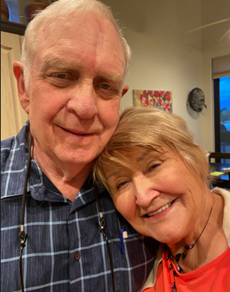

Gerald “Jerry” Sampont #3193, retired Seattle Police detective, passed away on January 17, 2024, at 79 years of age.
Jerry was born and raised in Kirkland. He graduated from Lake Washington High School alongside his close friends John Reynolds #2889 and Dick King #3124, Jerry openly admitted that he had always been up to mischief. When a counselor suggested that Jerry join the military, he took it to heart and decided to join the Coast Guard. This was during a time when the draft was still in effect, and joining the Coast Guard seemed like a great option, with the focus being on search and rescue as well as law enforcement.
Jerry aspired to become an electronics technician, but didn’t pass the test. Jerry was determined to achieve his goal, so he sought the help of a tutor, appealed to retake the test, and successfully passed the exam. Jerry was then sent to Groton, Connecticut, to begin electronics school. After graduation, he returned to Seattle and was stationed to Captain of the Port (Seattle). In November 1965, he received his orders to report to Alameda, California within two weeks for a ten-day training, his assignment was Squadron 1, Division 13, a newly formed division that was being deployed to Vietnam. He underwent Marine Corps survival and gun training prior to embarking on one of nine 82’ patrol boats. Jerry wasn’t too concerned, as being a communications specialist, he would “just” handle radio operations.
On February 22, 1966, Division 13 arrived at Cat Lo, Vietnam, 40 miles south of Saigon. Each vessel had a South Vietnamese naval officer with them as a translator. The USCG mission was to block the supply line on the Soriap River as the Navy boats were too large to navigate the rivers and the Navy swift boats would not show up for another year.
On his third night of patrol, while on a 95’ cutter, Jerry’s ship came under fire. Jerry’s captain swamped the enemy ship, but the gun fight was still on, even as the Coasties were trying to rescue the enemies from drowning, a bad guy swung up to the side of Jerry’s ship and fired his fully automatic AK-47 almost into Jerry’s face. Jerry stayed in Vietnam for a year and then came back to Seattle and served another six months to finish out his enlistment. He served in the Coast Guard on active duty from September 7, 1963, through September 7, 1967. Jerry then joined the Coast Guard Reserves.
When he came back to Seattle, Jerry worked as a box boy in a grocery store and attended junior college. He wanted to become a teacher. Jerry was a bartender at Black Angus when he met his future wife. While driving, Jerry overheard Jack Webb on the radio advertising for Seattle Police jobs. Knowing that bartending wasn’t for him, he took the test and did not pass. He was determined though, went and bought a book on policing, studied hard and re-took the test while he listened to Andy Williams “The Impossible Dream”. He passed the test with flying colors and was hired by SPD on June 16, 1969, as a Law Enforcement Trainee. Jerry was one of the original six trainees. He attended Academy Class #63, along with John Guich #3267, Jim St. Delore #3341, Dan Fordice #3280, Bob Baumgartner #3263, Curt Winther #3324, Keith Engstrom #3275, Dennis Bringham #2696, and Jules Werner #3276.
Jerry was assigned to patrol. In December 1971, officers responded to a prowler with a gun call at the Jensonia Apartments. The suspect had been hiding and was on the loose after escaping from the Hungerford Hotel where he had taken a guard’s revolver. Dan VanMill #2894 was shot at first and the suspect re-entered the apartment on the second story. Dennis Behrend #2781 was shot at from the closet the suspect was hiding in, Jerry, Dennis Zimnisky #2245 and Dennis “Pat” Kelly #3160 were all stationed on the rooftop adjacent to the suspect. There was a hut on the roof. Jerry carefully opened and closed the door of the hut and stuck his head around the opening when the suspect shot and narrowly missed him. Jerry jumped back and the suspect ran out of the hut while all three officers were returning fire. Jerry, along with Pat and Dennis, fired four shots and Dennis Nixdorf #2778 fired the shot that killed the suspect.
In March 1972, around 10:00 PM, Officers Clay McDonald #1458, and Ernest Shreve #3247, parked their car in the Bush Hotel parking lot to patrol the area on foot. While they were getting out of their car, a tenant on the fourth floor leaned out of a window and shouted “I’m going to kill you” right before he began firing a shotgun out the window. Officer McDonald was shot, but both officers returned fire and called for backup. This was the start of a 25-minute shootout, during which five officers were shot. Officer Larry Laxton #2758 reported that Sgt. Vern "Don" Adams #2153, went to his aid but was struck in the back as he was pulling Laxton out of the line of fire. Laxton had facial wounds, one of which narrowly missed his eye. Sgt. Adams suffered a back wound. Dale Eggers #2979 and Officer McDonald both had wounds to their face and chest while Lee Libby #3437 had superficial wounds that did not require hospitalization. Other officers made it to the fourth floor where the suspect was located. After firing through the door, the officers entered the room and found the suspect unconscious. The suspect had suffered with PTSD for years from the Korean War.
From 1976 to 1980, Jerry was assigned to the Academy as an instructor where he taught mock scenes, criminal law, and patrol procedures. During his tenure, Jerry updated and created lesson plans. On January 1, 1980, Jerry was promoted to Detective and assigned to the Pawnshop. During this time Jerry was starting to struggle with PTSD from Vietnam. Additionally, he was assisting his close family friends by managing a foundation. Jerry was kind and empathetic, he understood the immense pain and struggle that PTSD is. Jerry knew that it was a difficult journey, but he was determined to face it head-on. Jerry felt a deep sense of responsibility to help others who were dealing with similar traumatic experiences. He encouraged others to seek help so they could heal.
In 1990, Jerry retired from the Coast Guard Reserves as a Lieutenant Commander; he then retired, after 22 years from Seattle on April 22, 1991. Jerry stayed busy in his retirement. He continued to manage the foundation. He built a large home in Port Angeles which they resided in for 20 years. He owned his own plumbing company. Jerry arranged reunions with his fellow military service members. This reunion initiative started when he stumbled upon a photograph that his fellow Coasties had signed in Vietnam, pledging to reunite. He and his wife also enjoyed travelling throughout the US in their motor home alongside his partner, Pat, and his wife Sam. Jerry and Louise loved the beauty in Green Valley, Arizona, so they made their home there. Always giving, Jerry was a ham radio operator. Every Wednesday he would talk with the people stationed in Antarctica. Jerry would patch them through to their families so they could visit free of charge.
In 2004, Jerry received a direct commission from the Coast Guard Reserves. He was tasked with the training to welcome and safely escort the first nuclear submarine, named "Ohio", through hundreds of protestors to Bangor, on the Olympic Peninsula. Jerry was accompanied by (USCG Command Master Chief) Dave Malland #2553, (USCG Lt. Commander) Tom Witkowski #2318, and (USCG Commander) Roy Wedlund #2154. The Ohio was the first submarine to go to the new missile subbase, and protesters from all over the world threatened to block its passage. On the day of the mission, protesters in large and small boats attempted to block and board the submarine. Coast Guard boats were ready, and when the protesters tried to block and board the Ohio. They were hosed down, sending them into Puget Sound. Ships from Australia and Canada were impounded, and their crews arrested. The Ohio was completely secure and safe during the transit. The successful mission made national news.
In 2005, Jerry was interviewed by the Library of Congress for "The Vietnam Project" in which he shared his experiences of serving in Vietnam with the Coast Guard. Additionally, a documentary titled "Coast Guard at War" was made for the Discovery Military Channel.
The foundation Jerry ran continues to this day and plays an important role in supporting several charitable organizations, including Children's Hospital, the Coast Guard Stockings for children, the DESC, and the Ballard Food Bank. This foundation also has a 90% success rate in helping homeless women and children break the cycle of poverty by achieving self-sufficiency and independence.
Jerry once said that he wouldn't change anything he experienced in life, whether it was good or bad. When asked what advice he would give to others, he encouraged them to keep moving forward, persist in the face of obstacles, never accept "no" for an answer, and to always keep trying, no matter what. Jerry's words of wisdom are a reminder that life is a journey full of ups and downs, but it is our determination and resilience that ultimately define our success.
Jerry is survived by his wife of 54 years, Louise; his son Joseph; daughter Teresa and her husband Lynn, three grandchildren and 9 great grandchildren. Jerry was predeceased by his son Mike.
Written by:
Stephanie Coleman
Police Pension
Stephanie.Coleman@seattle.gov
